Annual Top-Ten Lists for Korean Cinema
The time-honored tradition of producing top ten lists at the end of the year is also followed here at Koreanfilm.org, with the caveat that they are often posted very late. Partly this is due to the fact that many of our contributors live outside of Korea, and so it takes some time before they are able to actually view the films, either at festivals or on DVD. Then there are people like myself who live in Seoul, but typically aren't organized enough to get these out on time. Your understanding is requested on both fronts.
There is no unified format for the lists that follow. Some focus exclusively on the films that were released in theaters in a given year, while others focus on the films a contributor was able to watch in that year. If you would like to contribute your own top ten lists with commentary to this page, please email me.
2017
Darcy Paquet
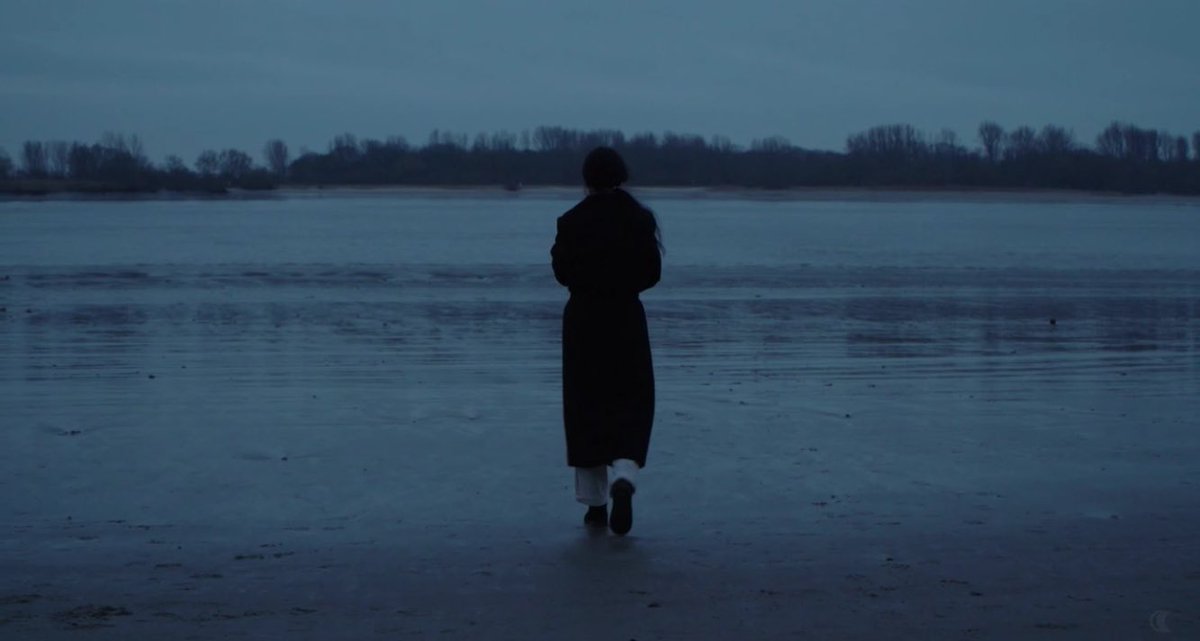 Although 2016 featured a gold mine of masterful big-budget releases (The Wailing, The Handmaiden, Train to Busan, The Age of Shadows), in 2017 we were back to a familiar pattern: independent directors, struggling to shoot their films on tiny budgets, completely outclassing the lineups of the major studios. There were a few exceptions to this rule, to be sure -- Jang Jun-hwan's 1987 was a truly inspiring look at a critical turning point in contemporary Korean history. That it came at a time when Korea is reckoning with the damage wrought by a decade of corrupt leadership made it even more poignant. The Fortress, like 1987 another CJ production, was surprisingly introspective and dark for such a big-budget film. The box office success of A Taxi Driver was encouraging (and a testament to the acting skills of Song Kang-ho), while I was also both impressed and entertained by Yang Woo-suk's political thriller Steel Rain. But it won't be hard to tell from looking at my list that these days at least, my heart is in the independent sector. These low-budget films are much more likely to surprise, inspire and challenge their audience, and most of them don't get nearly the exposure they deserve.
Although 2016 featured a gold mine of masterful big-budget releases (The Wailing, The Handmaiden, Train to Busan, The Age of Shadows), in 2017 we were back to a familiar pattern: independent directors, struggling to shoot their films on tiny budgets, completely outclassing the lineups of the major studios. There were a few exceptions to this rule, to be sure -- Jang Jun-hwan's 1987 was a truly inspiring look at a critical turning point in contemporary Korean history. That it came at a time when Korea is reckoning with the damage wrought by a decade of corrupt leadership made it even more poignant. The Fortress, like 1987 another CJ production, was surprisingly introspective and dark for such a big-budget film. The box office success of A Taxi Driver was encouraging (and a testament to the acting skills of Song Kang-ho), while I was also both impressed and entertained by Yang Woo-suk's political thriller Steel Rain. But it won't be hard to tell from looking at my list that these days at least, my heart is in the independent sector. These low-budget films are much more likely to surprise, inspire and challenge their audience, and most of them don't get nearly the exposure they deserve.
1. On the Beach At Night Alone and The Day After, dir. Hong Sangsoo
2. Jane, dir. Cho Hyun-hoon
3. 1987, dir. Jang Jun-hwan
4. Romans 8:37, dir. Shin Yeon-shick
5. The First Lap, dir. Kim Dae-hwan
6. Still and All, dir. Kim Young-jo
7. Ash Flower, dir. Park Suk-young
8. Merry Christmas Mr. Mo, dir. Lim Dae-hyung
9. The Fortress, dir. Hwang Dong-hyuk
10. The Table, dir. Kim Jong-kwan
I'm cheating a bit by putting both of Hong's 2017 releases at the top of the list. If I had to choose between the two I'd take On the Beach At Night Alone, because it really knocked me flat, but both deserve a place on the top ten and I want to save room for other films. (I was slightly less keen on Claire's Camera, which screened at Cannes but was not released in Korea. But there's a lot to like in that film as well.) I really do think Hong Sangsoo is at the peak of his career right now. It's so exciting to be following his work, particularly with him being so prolific right now.
There are a couple very impressive debut films on the list: Cho Hyun-hoon's freewheeling Jane, which I put at #2, and Lim Dae-hyung's Merry Christmas Mr. Mo, which manages to be both dry and heartwarming at the same time. The one documentary on my list (despite many worthy contenders) is also a feature debut: Still and All is a couple years old, but finally received its theatrical release in August. It's a creatively conceived, thought-provoking portrait of a community in Busan near Youngdo Bridge.
Given its timeliness, I'm disappointed that Romans 8:37 hasn't received more international exposure to date (though perhaps more festival announcements will come in 2018). Director Shin Yeon-shick shot this film well before the wave of allegations that brought down Harvey Weinstein and so many other abusive men in 2017, but Romans 8:37 speaks to this issue with tremendous nuance and insight. It's slow-paced and very talky, and he avoids boosting the drama in any artificial ways, but the end result is a work quite different from what you'd expect.
As time goes on it's harder and harder for me to make up these lists, since I've gotten to know many of these directors personally, and it's not easy to omit good films which I like. Perhaps I should also acknowledge that I did the English subtitles for several of these works: the Hong Sangsoo films, Romans 8:37, Ash Flower, and The Table (and numerous others which aren't on this list). I think it's inevitable that when you spend so much time working on the dialogue translation, your relationship to the film changes. There's a kind of intimacy that develops, even when you don't like the film! But I tried hard to stay impartial when drawing up this list.
Finally, I haven't mentioned Bong Joon-ho's Okja, which the Korean Film Council classifies as an American film because it was fully financed by Netflix. While it's probably more accurate to call it a US-South Korea co-production (KOFIC's designation is purely for the purpose of determining its eligibility for government support funds), I admit that Okja still has my head spinning. Despite being a diehard Bong Joon-ho fan, I had a hard time connecting with this particular movie. This may have as much to do with my own complicated feelings about agriculture, capitalism and all the other issues it raises, but the satire sort of left me behind. I've been meaning to rewatch it, but haven't yet had the chance. In the meantime I'm going to cheat again by keeping it separate from this list.
2013
Darcy Paquet
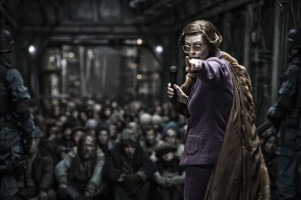 2013 marked another record-breaking performance at the Korean box office, with so many hit films it's hard to even remember them all at the end of the year. Some critics might contend that the real reason these films are hard to remember is that big, commercial Korean films no longer display much originality. But this year at least, I'd disagree. On a number of levels, mainstream Korean films displayed more creativity in 2013 than they have in recent years. Massive hits like Snowpiercer, The Terror Live, The Attorney, The Berlin File, The Face Reader, Cold Eyes and New World all contained their fair share of aesthetic surprises.
2013 marked another record-breaking performance at the Korean box office, with so many hit films it's hard to even remember them all at the end of the year. Some critics might contend that the real reason these films are hard to remember is that big, commercial Korean films no longer display much originality. But this year at least, I'd disagree. On a number of levels, mainstream Korean films displayed more creativity in 2013 than they have in recent years. Massive hits like Snowpiercer, The Terror Live, The Attorney, The Berlin File, The Face Reader, Cold Eyes and New World all contained their fair share of aesthetic surprises.
That said, six films in my top 10 list are from the independent/low-budget sector, which for me is where the really interesting work is taking place.
1. Snowpiercer, dir. Bong Joon-ho
2. The Fake, dir. Yeon Sang-ho
3. Nobody's Daughter Haewon, dir. Hong Sang-soo
4. Sleepless Night, dir. Jang Gun-jae
5. Very Ordinary Couple, dir. Roh Deok
6. Jiseul, dir. O Muel
7. City: Hall, dir. Jeong Jae-eun
8. Russian Novel, dir. Shin Yeon-shick
9. How to Use Guys with Secret Tips, dir. Lee Won-suk
10. Cold Eyes, dir. Jo Ui-seok and Kim Byeong-seo
Snowpiercer is getting very a warm reception overseas, at least in those territories where screenings have been allowed (I hope the Weinstein Company never buys another Korean film). In Korea the reception has been much more divided, at least among critics. This may be because the film lacks the distinctive local color (linguistic and cultural) of Bong's previous works, but for me this is an extremely ambitious, highly original, and beautifully realized science fiction thriller that deserves an important place in Korean film history.
Animated feature The Fake is a grim and disturbing viewing experience, but it is a striking story whose themes contain great resonance and universality. After the critical success of debut film The King of Pigs (which I had a more difficult time relating to), director Yeon Sang-ho's career is taking off. Another independent director who achieved a breakthrough in 2013 was O Muel with his film Jiseul, about the massacre of civilians on Jeju Island in 1948. The film won a major award at Sundance and achieved an almost unprecedented level of commercial success for a Korean independent release. Other low-budget films received much less attention, but many are worth seeking out, such as Sleepless Night, a simply told portrait of a young married couple; Russian Novel, an atmospheric, complex drama about aspiring writers; and the documentary City: Hall, which takes an in-depth look at the creative, political and bureaucratic pressures that affect the design and construction of Seoul's new City Hall.
Three of the films on my list impressed me for displaying such energy and wit within the confines of established commercial templates: relationship drama Very Ordinary Couple, which feels surprisingly real; comedy How to Use Guys with Secret Tips, which is very well executed and simply hilarious; and the thriller Cold Eyes, which achieved the difficult task of remaking a film from another culture in a way that replicates the original's strengths and adds some strengths of its own.
Meanwhile, there were a number of features (more so than in previous years) that I didn't have room for on this list, but which definitely deserve a mention. Hong Sang-soo's Our Sunhi has been overlooked partly out of the desire to include more filmmakers in my top 10, considering that he has another film at #3 and virtually every year he is near the top of the list. But this is a great film too, unfairly omitted. Pluto by the up-and-coming director Shin Suwon considers a familiar topic - the cutthroat competition in Korean high schools - in a creative and unusual way. I'm also a fan of New World, a gangster movie that is more expansive and less melodramatic than most of the Korean gangster movies of the past.
Three more impressive documentaries also deserve acknowledgment. Jeju Prayer is a beautifully shot and slightly experimental portrait of Jeju Island, its beautiful landscape, and memories of the 1948 massacre (how interesting that it should appear in the same year as Jiseul...). Zhang Lu's Scenery is a fascinating collection of interviews with migrant workers (mostly about what they dream at night) interspersed with shots of Korean landscapes will be more familiar to them than to most citizens of South Korea. And Nora Noh is a spirited and sympathetic portrait of Korean's first fashion designer, a woman who broke through numerous social barriers throughout her very interesting life.
2012
Darcy Paquet
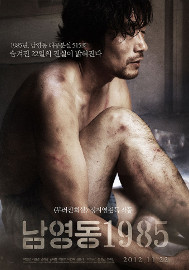 At the end of 2012, in my weekly column at Daum.net, I drew up a list of my top 10 low-budget films from the year. In total there were a record 80+ Korean films with a budget of less than 1 billion won ($900,000) that received a theatrical release in 2012. Subsequently I sat down to make an overall top 10, and it occurred to me that I didn't particularly want to replace any of the low-budget films with mainstream commercial works. At least in this year, it was pretty clear that the independent sector was where most of Korean cinema's creativity lay.
At the end of 2012, in my weekly column at Daum.net, I drew up a list of my top 10 low-budget films from the year. In total there were a record 80+ Korean films with a budget of less than 1 billion won ($900,000) that received a theatrical release in 2012. Subsequently I sat down to make an overall top 10, and it occurred to me that I didn't particularly want to replace any of the low-budget films with mainstream commercial works. At least in this year, it was pretty clear that the independent sector was where most of Korean cinema's creativity lay.
It's not that the mainstream lineup had no well-made films: Masquerade was certainly very well constructed, and I think it deserved its 12 million+ admissions tally. The Thieves, which sold an astounding 13 million tickets, was fun to watch. Other films were impressive in various ways -- Nameless Gangster and Eungyo had many ardent supporters, though I personally had a hard time fully embracing these works. In the end, I did end up inserting the nostalgic drama Architecture 101 in at #8, knocking the satiric and hilarious indie film Barbie off the list (sorry, Barbie). So here's my overall top 10 of 2012:
1. National Security, dir Chung Ji-young
2. Pieta, dir. Kim Ki-duk
3. Juvenile Offender, dir Kang Yi-kwan
4. Romance Joe, dir. Lee Gwang-guk
5. Planet of Snail, dir. Lee Seung-jun
6. Talking Architect, dir. Jeong Jae-eun
7. In Another Country, dir. Hong Sang-soo
8. Architecture 101, dir. Lee Yong-joo
9. The Winter of the Year Was Warm, dir. Cho Sung-kyu
10. Padak, dir. Lee Dae-hee
For me the standout of 2012 was Chung Ji-young's National Security, a very political film that impressed me most not for its politics, but for its universal, humanistic elements. Probably the most talked-about premiere at this year's Busan International Film Festival, it presents in unnerving detail the torture of democracy activist Kim Geun-tae over a period of 22 days in autumn 1985. The idea of sitting through a 106-minute film which consists primarily of torture sequences is certainly daunting. But somehow, through effective characterization and well-structured drama, the director makes the story as engaging and moving as it is disturbing. In the end, the strongest element of the film is its compassion for Kim Geun-tae and others who underwent similar ordeals.
The other films in this list provided me with many of my viewing highlights in 2012. There were a number of incredible acting performances, from Lee Jung-hyun and Seo Young-joo in Juvenile Offender to Kim Tae-woo and Yeh Ji-won in The Winter of the Year Was Warm; Kim Se-ron and Kim A-ron in Barbie to Jo Min-soo in Pieta, not to mention Isabelle Huppert in In Another Country. In the documentary Planet of Snail I was introduced to a remarkable and unforgettable relationship that actually lives up to the highly overused adjective "inspiring." The late architect Jeong Gi-yong left a similarly bittersweet and memorable impression in Jeong Jae-eun's Talking Architect, which simultaneously considers the role and position of architecture in contemporary Korean society.
Why is it that independent films were so much more interesting than the mainstream commercial films in 2012? A lot of critics worry that there's something in today's filmmaking system that puts a damper on real creativity. Though it should be said that commercial cinema staged somewhat of a creative rebound in 2013.
(Finally, I never thought I'd have to write a disclaimer like this, but I appeared in two releases from 2012 as a supporting actor: Im Sang-soo's The Taste of Money and Yook Sang-hyo's Almost Che. I've decided to disqualify them from my top 10, partly because it really is hard to be objective when I spent so much time on the set shooting these films, and mostly because I'm just too embarrassed to list them. But I do think there are very interesting elements to both works. The Taste of Money in particular has not been well received abroad, but in Korea does have its share of passionate defenders :)
2011
Darcy Paquet
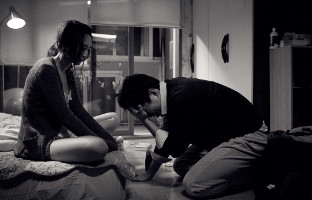 Darcy's Top 9+1 of 2011. Each year I assemble my top 10 list out of the Korean films that have been released in theaters over the previous 12 months. The small independent films that I catch at the Busan or Jeonju film festivals may not be released by December, but they generally do get a small commercial release within a year or two, so I can include them in a later list.
Darcy's Top 9+1 of 2011. Each year I assemble my top 10 list out of the Korean films that have been released in theaters over the previous 12 months. The small independent films that I catch at the Busan or Jeonju film festivals may not be released by December, but they generally do get a small commercial release within a year or two, so I can include them in a later list.
This year, however, I came across a great film that may end up not getting a commercial release, so I squeezed it in where #10 would normally go. I was racking my brain over that #10 slot anyway.
1. The Day He Arrives, dir, Hong Sang-soo
2. The Journals of Musan, dir. Park Jung-bum
3. Arirang, dir. Kim Ki-duk
4. Sunny, dir. Kang Hyoung-chul
5. Come Rain, Come Shine, dir. Lee Yoon-ki
6. Animal Town, dir. Jeon Kyu-hwan
7. Bleak Night, dir. Yoon Sung-hyun
8. Punch, dir. Lee Han
9. Re-encounter, dir. Min Yong-keun
+ Out Of the Cave, dir. Ahn Kearn-hyung
Looking over my list, I see that I've gone totally low-budget this year. If you take out Sunny and Punch -- which themselves are only mid-sized commercial works -- the combined production budgets of the remaining eight films probably amounts to less than So Ji-sub's acting fee for Always. I mean that quite literally.
Hong Sang-soo has never made a bad film, but I think The Day He Arrives is going to remain a highlight of his filmography for me. I hear many of the director's ardent fans saying similar things. It's not that he's developed some totally new approach or anything, but this film feels like such a finely tuned expression of all that makes him interesting as a filmmaker. It's concise, gorgeously shot in black-and-white, and its mysteries beckon not as puzzles to be solved, but as patterns to be admired in themselves.
Park Jung-bum's The Journals of Musan has received something like 18 awards from festivals around the world, and it's easy to understand why. A former assistant director under Lee Chang-dong, Park has demonstrated that he has real talent, and many people will be watching to see if he can emerge as a major director.
I'm not sure if the screenings of Arirang at Cinecube in December qualify as a commercial release, but anyway... this is my favorite Kim Ki-duk film. Although I sympathize with the viewer at Cannes who described it as "listening to a drunk guy in a bar talk about how he used to be famous, and how all his former friends are assholes," I think if you actually listen to what the drunk guy is saying, he touches on many of filmmaking's essential dilemmas. It's not that I believe everything that Kim is saying or staging in this film, but the work as a whole is jolting in its originality and worth being taken seriously.
Sunny gets extra points for being so much fun, and for taking a story about ordinary women's lives and turning it into a 7 million ticket hit. Very few directors could have accomplished what Kang Hyoung-chul has done in his first two films (the other being his debut Scandal Makers).
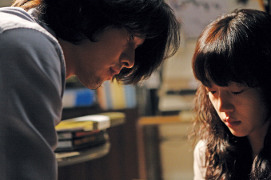 I can hear the groans at my choice for #5, Lee Yoon-ki's painfully introspective Come Rain, Come Shine, starring Hyun Bin and Lim Soo-jung. I'm willing to posit that the reason this film has stuck so firmly in my memory is because of some particular aspect of my own personal neuroses. But in the end, all criticism is personal, and there's something in the relationship portrayed here that I've never found in any other film.
I can hear the groans at my choice for #5, Lee Yoon-ki's painfully introspective Come Rain, Come Shine, starring Hyun Bin and Lim Soo-jung. I'm willing to posit that the reason this film has stuck so firmly in my memory is because of some particular aspect of my own personal neuroses. But in the end, all criticism is personal, and there's something in the relationship portrayed here that I've never found in any other film.
Animal Town I think is Jeon Kyu-hwan's best film to date, and what makes it stand out is not the structure of its narrative or the clever twist at the end, but an elemental, driving energy in the portrayal of its lead characters. It's hard to describe, but many people end up articulating it in similar ways. Bleak Night is another outstanding debut film -- a work that has been particularly embraced in Korea, while many international viewers seem to prefer The Journals of Musan. No matter... there is room for two great debuts in 2011. Punch ("Wandeuk-i") actually could have used a bit more punch in the resolution of its story, but its characters are unforgettable and it well deserves all of the 5 million+ admissions that it has recorded. Finally, Re-encounter ("Hyehwa, dong") achieves a great sense of intimacy and drama in its small-scale narrative, and it has bequeathed the Korean film industry a great new talent in young actress Yu Da-in.
The "other" film on my list is the documentary Out Of the Cave, and I'm happy to be including it on this list because it seems that there is a burgeoning creative energy among Korean documentarians. Director Ahn Kearn-hyung shot the film at his apartment complex; most of it consists of shots of homeless cats and interviews with his sister. But what makes the film stand out is Ahn's own narration, more like an essay than the commentary you find on most documentaries. Although it begins as a thoughtful consideration of his efforts to feed the cats and make sense of his family's issues, his questions and musings become ever more abstract as we move to the latter half of the film. If this sounds frustrating or boring, it's actually pretty engaging.
Other films that almost made the list... Dooman River: it probably should be on the list, but at times Zhang Lu's directorial decisions intrude awkwardly into the film. Moby Dick: an involving and creatively staged thriller. Late Autumn: its high points really soar. Penny Pinchers: it's "just a romantic comedy", but it's a rather charming one.
2010
Darcy Paquet
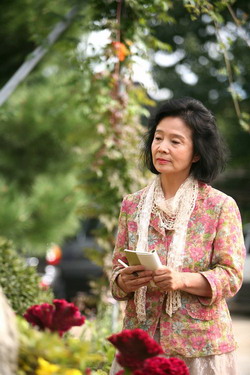 Last fall my family and I spent three months in the US, to let our kids spend some meaningful time in an English-speaking environment. It's the longest I've been away from Seoul since I first moved there in 1997, and it felt strange to be missing so many new releases. I'm now almost caught up. Although there are a few more films that I hoped to watch before compiling my 2010 top ten list (Rolling Home with a Bull and Enlightenment Film, among others), I think it's time to cut bait:
Last fall my family and I spent three months in the US, to let our kids spend some meaningful time in an English-speaking environment. It's the longest I've been away from Seoul since I first moved there in 1997, and it felt strange to be missing so many new releases. I'm now almost caught up. Although there are a few more films that I hoped to watch before compiling my 2010 top ten list (Rolling Home with a Bull and Enlightenment Film, among others), I think it's time to cut bait:
1. Poetry, dir. Lee Chang-dong
2. Oki's Movie, dir. Hong Sang-soo
3. Bedeviled, dir. Jang Cheol-soo
4. The Unjust, dir. Ryoo Seung-wan
5. Eighteen, dir. Jang Geon-jae
6. HaHaHa, dir. Hong Sang-soo
7. I Saw the Devil, dir. Kim Jee-woon
8. Passerby #3, dir. Shin Su-won
9. The Yellow Sea, dir. Na Hong-jin
10. Secret Reunion, dir. Jang Hun
I saw Poetry twice during its release, and was captivated by it. It's a rich film that devotes deep, serious attention to how it presents its characters and the situations they face. The story itself is moving, but I also found Lee's devotion to the "ethics" of his film to be moving. I think few directors put so much thought into their works.
There were two films from Hong Sang-soo this year, and I think it says something about your personality as a critic whether you prefer HaHaHa or Oki's Movie. I'm planning to teach HaHaHa in my Korean cinema class this spring, and I'm guessing that the film will grow on me with multiple viewings, but in Oki's Movie I really felt that Hong was asking more questions and pushing into new territory. People who know me well will say that my fondness for Jeong Yu-mi tipped the scales, but I think that's only part of it.
Bedeviled was in some ways the most exciting film of the year for me, because it's a first time director and it caught me by surprise. One of my favorite bloody gory movies ever. The Unjust was also a very pleasant surprise, in that director Ryoo showed that he can take a screenplay written by someone else and really put life into it (most directors can't).
Among smaller-scale independent works, the one that really stuck with me (unexpectedly) was Eighteen, a story about teenagers that won the top prize at the 2009 Vancouver Film Festival. Both in terms of narrative and imagery, director Jang Gun-jae is able to leave a big impression with very little. Passerby #3 has a fascinating character at its center (a married woman with a teenage son, trying to make her debut as a film director), and it gives you a funny and heartbreaking perspective on how the film industry really works.
Finally, three big-budget films: I Saw the Devil, The Yellow Sea, and Secret Reunion. The first one I'll continue to try defending against its detractors, though in the end it may simply boil down to whether you go with it, or you don't. I agree that it probably didn't need to go quite as far as it did, but I still find it very impressive. The Yellow Sea I'm slotting in at #9, but apparently the director is preparing an international version that will be considerably tighter (the excessive running time was one of its bigger problems). It may be that a more impressive film emerges later this year. And finally, Secret Reunion really impressed me on first viewing with its mix of bouncy dialogue and suspense, though I realized on second viewing (in Udine) that much of its humor is lost in translation.
Just to clarify, this top 10 list is for films that got their official release last year. There were a couple that I saw at festivals last year (particularly The Journals of Musan) that I expect to place high on the 2011 list.
2009
Darcy Paquet
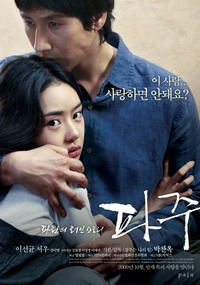 It's funny, I spent much of the year 2009 in a funk over the current state of Korean cinema. And yet when I sit down to make a top 10 list, I am reminded of how many good films there actually were. I guess what actually happened is that the middle fell out of Korean cinema -- whereas the majority of Korean films used to be mid-budget genre projects, now almost everything is either very big or very small. To some extent this is a worldwide trend, but the particulars of the filmmaking environment in Korea (especially the lack of a viable DVD market) seem to compound the problem.
It's funny, I spent much of the year 2009 in a funk over the current state of Korean cinema. And yet when I sit down to make a top 10 list, I am reminded of how many good films there actually were. I guess what actually happened is that the middle fell out of Korean cinema -- whereas the majority of Korean films used to be mid-budget genre projects, now almost everything is either very big or very small. To some extent this is a worldwide trend, but the particulars of the filmmaking environment in Korea (especially the lack of a viable DVD market) seem to compound the problem.
There were two kinds of big films in 2009: huge commercial projects like Haeundae and Take Off, which earned a lot of money and made some people more optimistic about the state of the industry; and films by some of Korea's biggest name directors, i.e. Park Chan-wook (Thirst) and Bong Joon-ho (Mother). The latter films underperformed commercially, but in my opinion were both quite fascinating.
The growth and success of small films was particularly surprising, however. I've quoted this statistic elsewhere, but five years ago only 3 films with a budget of less than ten billion won (about $1 million) received a theatrical release in Korea. In 2009 my back of the envelope estimation is that there were over 50. Many of these were very bad, excruciatingly bad -- I sat through a lot of them -- but others were very, very good. Some of them even did quite well commercially.
Film magazine Cine21 polled 35 critics and collated the (interestingly diverse) results to determine the following ranking for the year's best films: (1) Mother, (2) Like You Know It All, (3) Paju, (4) Thirst, (5) Breathless. I was included among the 35 critics, and my top five was published in the magazine, but now I'm going to contradict myself and rearrange spots 3-5. Here is my personal top 10:
1. Paju
2. Thirst
3. Like You Know It All
4. Mother
5. A Brand New Life
6. The Actresses
7. Possessed
8. I Am Happy
9. The Pit and the Pendulum
10. Daytime Drinking
The top two films on this list were true standouts for me. Thirst has proven to be an audience divider, but it may well be my favorite Park Chan-wook film. It definitely felt like the first step in a new direction for Park (is it demeaning of his previous work to say that this film felt more mature?). With time I may well change my mind and consider it the best film of 2009. Meanwhile Paju really hit a nerve in me. It's a complex film whose complexities only seem to grow deeper the more you consider them. And I liked it as much for what it didn't show as for what it did. (I can feel that these vague, abstract comments are unconvincing arguments, but how can you to justice to such films in just a few lines?)
The next three films occupy my "second tier". As time goes on, I am becoming more and more personally attached to the films of Hong Sang-soo, and the second half of Like You Know It All in particular was captivating. Then there is the latest film by my favorite director Bong Joon-ho. I've come to conclude that Mother is a progression of amazing scenes, but there is something about the overall structure of the work that prevents each scene from building off the previous ones as it should. The film's momentum seems slightly off, somehow. But it is still an amazing work. Finally, A Brand New Life is the heartbreaking story of a girl sent to an orphanage, and the direction and acting are so perfectly pitched that it is a thrill to watch.
As for the rest -- The Actresses is a great idea for a film, and it is surprisingly entertaining for a film with basically no story; Possessed should go down as one of the classic Korean horror films, and it's clear this first-time director Lee Yong-joo is worth watching; I Am Happy by Sorum director Yoon Jong-chan seems to have had no international exposure at all after screening as the closing film at Pusan in 2008, but it deserves attention; The Pit and the Pendulum is clearly not a movie for everyone, as it toys with the viewer's perceptions and expectations and then leaves you completely clueless in the end, but there is something about this cold, uncomfortable work that sticks with you; and finally Daytime Drinking for making such an interesting film on such a tiny budget, and for having one of the best endings of 2009.
So why isn't Breathless on my list? To be honest, I feel that this is a film I should re-watch, and I reserve the right to change my opinion about it. It's not that I didn't like it, and I have no argument with the plaudits given to the acting, but I feel the film itself has been overpraised. While watching it, I remember feeling disappointed that the film would take this particular situation and move so forcefully towards melodrama as its ultimate destination. The ending feels too easy to me in many ways. But obviously, many people disagree with me!
Tom Giammarco
When I wrote a list of my favorite films of 2009 on Seen In Jeonju, I included thirteen movies on the list. For this list, we are limited to just ten. Some cuts were easy to make. Haeundae was enjoyable, but not really deserving of the top ten spots. Others were more difficult. Here is what remained...
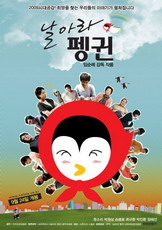 1. Fly Penguin -- No matter what criteria I used to decide on the best Korean films of 2009, this film by director Im Soon-rye would come out near the top. It is made as a well-connected omnibus where all the characters are slightly linked to each other. It is also a social commentary that manages not to be preachy-such as when Im made "The Weight of Her" for the original If You Were Me collection. In this film she deals with a wide range of topics including the obsession to learn English, changing gender roles and alternative life choices.
1. Fly Penguin -- No matter what criteria I used to decide on the best Korean films of 2009, this film by director Im Soon-rye would come out near the top. It is made as a well-connected omnibus where all the characters are slightly linked to each other. It is also a social commentary that manages not to be preachy-such as when Im made "The Weight of Her" for the original If You Were Me collection. In this film she deals with a wide range of topics including the obsession to learn English, changing gender roles and alternative life choices.
2. Daytime Drinking -- The ultimate Korean road movie is filled with realistically quirky characters and unusual but possible events that combine to make a bizarre, memorable journey for our sympathetic main character.
3. Old Partner -- This is a movie I wish everybody could see. I never would have dreamed that the semi-documentary of a cow and its owner could be so engrossing and touching.
4. Himalaya, Where the Wind Dwells -- You would think that a film starring Choi Min-shik would be promoted more. But perhaps the decidedly art house nature of the film prevented that. If you require a lot of action in your films-or dialogue for that matter-you may want to avoid this film. However, if you like strong, character driven dramas set against a stark, beautiful background, then you will love this as much as I did.
5. Possessed -- It is difficult for horror films to make it onto a best of the year list, but Possessed deserves it. Korean horror seems to have stagnated over the years resulting in 2009 giving us such films as Yoga Academy and the latest installment of Whispering Corridors-the former laughable, the latter forgettable. Possessed however is both terrifying and memorable.
6. Mother -- This film definetely benefited from a second-viewing-this time without the student I originally watched it with who complained the entire time about the mistakes made in acupuncture theory. (He is majoring in Oriental Medicine and swears that there is no place to stick a pin that will make you forget all bad things). Excellent acting by Kim Hye-ja and Won Bin.
7. Take Off -- Even though this movie is hopelessly mainstream, I really enjoyed it. It succeeds in its task of making you feel the thrill, suspense and danger of ski-jumping while making each character interesting and their problems real. Like films such as Marathon, there is not deep, hidden meaning-it's just fun.
8. The Story of Mr. Sorry -- The last Korean-made animation I really enjoyed was Oseam but I have finally found another. Done in the style of The Fantastic Planet, this is movie is unique among Korean animations. Although the story sounds like it might be childish-a man shrinks to microscopic size to clean ears?-this film is definitely not for children especially after he discovers the doorway to the subconscious minds of his clients.
9. Treeless Mountain -- Two sisters are passed around among their relatives as no one seems to have the means to afford to raise them. Sad as the topic may seem, the film offers a lot of hope and celebrates the resiliency of children.
10. Breathless -- Just reading a blurb about the plot initially left me uninterested in this film. Yet another gangster who wants to get out of a life of crime? But it is so much more than that and has been winning awards from film festivals around the world. An excellent and surprising movie that has been praised for the acting of the lead-who is also the director of the film.
2008
Darcy Paquet
I had two major goals for the year 2008: one was to finish writing my book, and the other was to try to breathe some life back into this website. If you are strict about the dates, I suppose I failed in both resolutions, although I did manage to finally send my manuscript to the publisher in the first week of January (six months late). There is still some editing to do on it, but it should be published on schedule in this coming August or September. More about that later...
I hadn't counted on physical problems being my biggest challenge last year, with the RSI in my arms finally reaching a point where I had to stop typing altogether from September. But I've managed to train myself how to use voice recognition software, and in the meantime my arms are healing. The one thing that is especially difficult to do with voice commands is to update the site, but thankfully there are some people who have generously offered to help me.
In the Korean film industry, the general mood in 2008 reached a new low. Companies continued to struggle, and there were a lot of bad films that seemed to display the signs of cut corners or a lack of polish. However if you separate out the good films and consider them as a group, it wasn't such a bad year. Particularly encouraging was the critical and/or commercial success of a number of debut films, including The Chaser, Crush & Blush, Rough Cut, and Scandal Makers.
I rearranged the list below on several occasions before stopping at the current configuration. I have very warm feelings towards the top seven films in particular. I hope that all of them live long in people's memories.
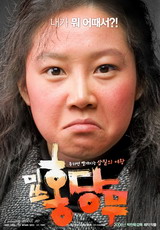 1. The Chaser -- for the genius of its execution, rather than its originality. Director Na Hong-jin may have a long career ahead of him.
1. The Chaser -- for the genius of its execution, rather than its originality. Director Na Hong-jin may have a long career ahead of him.
2. My Friend and His Wife -- this 2006 film by Shin Dong-il finally received a theatrical release in November. A comparatively low budget, emotionally wracking film that lurches left and right but never loses control.
3. Night and Day -- less tightly wound than many other Hong Sang-soo films, this is one of my favorites.
4. My Dear Enemy -- the directing prowess of Lee Yoon-ki is less obvious in this film than in This Charming Girl or Ad Lib Night, because he lets the amazing acting performances of Ha Jung-woo and Jeon Do-yeon dominate.
5. Crush & Blush -- it's at number five, but this is my emotional favorite because of its weird energy and bad attitude.
6. The Good, the Bad, The Weird -- exciting, funny, quirky, explosive, original, even if a bit thin.
7. Rough Cut -- somehow every part of this film worked really well, and it was hugely entertaining too.
8. Frozen Flower -- a sexy epic period drama that offers up little original, but breathes new energy into familiar settings.
9. Life Track -- a co-winner of the top prize in Pusan in 2007 that was released theatrically in 2008. Anguished and grim, this is a Chinese-Korean coproduction by an ethnic Korean director living in Yanbian.
10. Scandal Makers -- at long last, a Korean comedy that despite being thoroughly conventional, is directed with skill and flair.
I realize that there may be little information about some of these films on the site right now, but I'll try my best to get to them in the near future.
Tom Giammarco
Unlike the preceding year, 2008 had many movies I could choose from and feel confident about including on this list. Many of the films, however, are less¡¦artistic¡¦than I would hope for, but the ones listed below are enjoyable nonetheless.
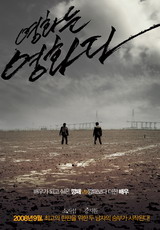 1. Rough Cut -- I honestly thought after watching The Chaser that it would be at the top of my list. Then I saw Rough Cut and was amazed at how good it was. Genuinely shocking movie was fantastic action scenes, good acting and a well-written scenario.
1. Rough Cut -- I honestly thought after watching The Chaser that it would be at the top of my list. Then I saw Rough Cut and was amazed at how good it was. Genuinely shocking movie was fantastic action scenes, good acting and a well-written scenario.
2. The Chaser -- This movie kept me on the edge of my seat the entire time. The violence may have caused me to cringe, but it served to up the suspense and general terror I felt-my whole body ached after I watched it. The writing may be a little heavy-handed, especially in its treatment towards the police, but overall an excellent, must-see movie.
3. Action Boys -- I first saw this film at the Jeonju International Film festival and was surprised how good a documentary about the stuntmen involved in making Korean films was. I watched it again when it had a general release and finally bought the DVD. Do yourself a favor and watch this movie. You will be amazed at how hard it is to make a living in film and what some people resort to doing!
4. Radio Dayz -- I am probably in the minority including this film in the top ten list, let alone ranked at number four! Although it is not the most thought-provoking film of the year, it is extremely enjoyable-especially the acting of Ryu Seung-beom.
5. Forever the Moment -- The true story of the Korean Olympic Women's Handball Team. The sport of handball, generally not one of my favorites, is made much more exciting by getting to know the characters and their motivations for playing. Excellent performances all around.
6. The Guard Post -- Here is a movie that requires you to pay close attention while watching as frequent jumps between the past and present may be confusing. However, the concentration is worth it as this movie can inspire hours of conversation afterwards as you discuss the possible meanings of the events in the film.
7. GoGo 70s -- Like Radio Dayz, this movie could have been so much more if it had taken the time to examine the political climate of the time a little more critically. Despite the raids and arrests, the oppression of the times comes across somewhat too light. However, that is exactly what the film is meant to be-just a light look back on the rise of a popular band. Fun but not deep.
8. Crossing -- While I cannot comment whether or not this is an accurate depiction of the lives of some North Koreans who leave their country for a new life in the South, I can say that the movie was quite good and had far more dramatic impact than I thought it would.
9. Divine Weapon -- What strikes me most about this film was the details put into the costumes and sets. It is a good story and a clear demonstration on how to make a historical drama/action movie (as opposed to something like The Sword With No Name)
10. Scandal Makers -- Of the 100 films on this list, I believe this may be the sole comedy. That should stand as testament to how good this film really is. I normally do not like pure comedies but I am willing to make an exception for this film.
2007
Tom Giammarco
2007 was one of those years. There were many films that I liked but not really many that I truly believe should be in the top one hundred films of the decade.
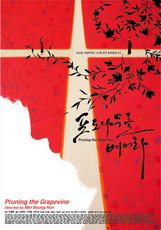 1. Boys of Tomorrow -- Drawing on feeling of hopelessness and frustration among the young generation as he did in his debut film, My Generation, director Noh crafts an intriguing story of three brothers struggling to make a life for themselves.
1. Boys of Tomorrow -- Drawing on feeling of hopelessness and frustration among the young generation as he did in his debut film, My Generation, director Noh crafts an intriguing story of three brothers struggling to make a life for themselves.
2. Secret Sunshine -- I have not watched this film since I initially saw it back in 2007. That is because the emotions depicted by Jeon Do-yeon are so powerful and raw that I felt drained just watching her. However, I highly recommend any fan of film, not just Korean film, to see this movie.
3. Seven Days -- Like Secret Sunshine, this is powerful film largely due to the acting of the leading lady, Kim Yoon-jin.
4. May 18 -- The event known as the Kwangju Massacre occurring in 1980 spawned numerous movies, particularly after the actual truth behind the tragedy were revealed. While A Petal remains the best, May 18th is a powerful emotional ride that looks at how the event affected the lives of the people of Kwangju.
5. Pruning the Grapevine -- A beautifully filmed and written art film which tells the story of a young man who becomes a priest primarily to be close to his ex-girlfriend who had broken up with him to become a nun and how his own faith is tested.
6. Paradise Murdered -- An atmospheric thriller that takes place on a remote island with a small population. A series of murders rocks the small community who become increasingly wary of one another knowing that one of them is a killer. Not a groundbreaking film, but very entertaining.
7. Epitaph -- This film is also very atmospheric as three tales of horror unfold in an old hospital. While the first two of the interwoven stories are quite engrossing, I found the final story rather confusing and that lowers this films rank to seventh.
8. HERs -- A tale of three women or share the same name? Or is it about one woman at different stages in her life? In either case, this movie gives you a lot to think about.
9. Shadows in the Palace -- I think I liked the idea of this movie more than how parts of it were actually executed. It is a unique premise that leaves you wondering just how much of the events onscreen are of human doing and at what point do supernatural forces take over.
10. Our Town -- This tale of two serial killers is raised above the myriad of other murder tales by two excellent performances by Oh Man-seok and Ryu Deok-hwan. Be warned though, the violence can be a little off-putting.
2006
Darcy Paquet
As usual, these are selected from the films that received a theatrical release in 2006, so works like Pruning the Grapevine -- which was one of my viewing highlights of last year -- will be included in the 2007 list. Also note that I included The Magicians in last year's list, assuming that it would never get a theatrical release. Happily, I was proven wrong, but I'm not going to list it twice.
Drawing up my list was in some ways easy. Of the 100+ films released last year, for me there were three standouts (Grapevine, which will be released next week, would have made four), and 15 other films that made my short list. To be honest, I don't have especially strong feelings about the order of films #4-18. I like all of them very much, and all were a mix of exciting strengths plus the occasional flaw.
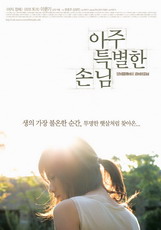
1. Woman on the Beach
2. Ad Lib Night
3. The Host
4. Family Ties
5. My Scary Girl
6. Tazza
7. Host & Guest
8. Bloody Tie / A Dirty Carnival (tie)
10. Roommates
Special mentions (in no order): Grain in Ear, The Peter Pan Formula, The City of Violence, Dasepo Naughty Girls, Sundays in August, No Regret, Solace, I'm a Cyborg but That's OK
Hong Sang-soo's films do sometimes feel like successive volumes in a single work, so it can be hard to compare them. When describing books, we don't usually say, "Chapter two was excellent, but I'm not so sure about chapter four." Nonetheless, Woman on the Beach proved to be a particularly dramatic chapter in Hong's ongoing work, and it has certainly revived critical interest in the director. In this instance, I'm happy to lend my voice to the chorus of praise. The low-budget, introspective Ad Lib Night by Lee Yoon-ki was clearly an improvement over Love Talk, and for me was even more exciting than his debut This Charming Girl. I love the way that he charges every moment of this very simple, potentially boring story with mystery and deeper resonance. The acting is fantastic, and the fact that this film was made with TV money and shot in two weeks gives me hope for the future creativity of Korean cinema.
As for the tie at #8, I find it very interesting to compare these two films: the former which was more popular with domestic critics, and the latter which was highly praised by the few foreign critics who have seen it. A Dirty Carnival is more vivid in my memory at this point, likely due to the strength and clarity of Yu Ha's storytelling. I still do have problems with the romance elements of the film, however -- it baffles me how he can resort to such cliches (in this and in Once Upon a Time in High School) after proving he can present relationships in a very realistic and innovative way in Marriage is a Crazy Thing. Bloody Tie, meanwhile, was one of the premiere acting showcases of 2006, and presented its setting with a vividness and color that was really exciting.
Other high points and low points of 2006:
* Favorite classic Korean film viewed in 2006: Spring of the Korean Peninsula (1941), Lee Byung-il.
* Biggest disappointment of 2006: The musicals (Midnight Ballad for Ghost Theater and The Fox Family)
* Worst film of 2006: Hanbando
* Favorite non-Korean film of 2006: Linda Linda Linda (Yamashita Nobuhiro, Japan)
* Favorite retrospective film of 2006: The Naked Kiss (1964) by Samuel Fuller.
* Favorite DVD viewing of 2006: Trouble in Paradise (1932) by Ernst Lubitsch.
Tom Giammarco
It was about this time, I believe, that people started to be concerned about the state of Korean movies and wondering if the popularity the films had enjoyed just a few years earlier would be able to be maintained or if the creative energy that fueled the Korean Wave was running out. Production for mainstream theater, with a few notable exceptions, suffered greatly but the indie scene still had some tricks up its sleeve.
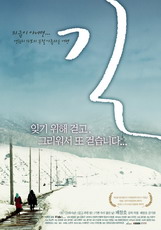 1. Magicians -- One of the best Korean films ever, not only in 2006, this one-cut movie is a marvel of filmmaking. Even flashbacks are handled well and without any confusion as the camera never stops moving around the set. Two versions exist-a full length and a short. I prefer the full-length one.
1. Magicians -- One of the best Korean films ever, not only in 2006, this one-cut movie is a marvel of filmmaking. Even flashbacks are handled well and without any confusion as the camera never stops moving around the set. Two versions exist-a full length and a short. I prefer the full-length one.
2. The Forgotten Child: Shin Sung-il is Lost -- A fascinating tale of children in an orphanage who are taught by the adults running it that eating is sinful. It is a shame that the promised sequel was never filmed.
3. No Regrets -- A tale of the struggles of two men as they try to come to terms with their relationship and how to live in a society that forbids their love. Excellent acting and a somewhat different ending than most queer-themed Korean films.
4. Family Ties -- I was really enjoying myself while watching this movie and would have liked it no matter what. However, it was how the end tied everything together that I found truly impressive and launched this film onto the list of my favorites.
5. A Dirty Carnival -- If you like your movies dark and gritty, this one's for you. It's not just another gangster flick. The characters are well-rounded and their motivations well-defined. Jo In-seong is excellent in the lead role.
6. The Host -- Monster movies in general are often dismissed as childish. Not so when its master director Bong Joon-ho at the helm. A tight tale with political subtext that can be enjoyed at many different levels.
7. Road -- This is one of the quiet films set before a beautiful backdrop where we get to know the main character, in this case played by director Bae Chang-ho, more through his actions than his dialogue.
8. Tazza -- I would be surprised if this film didn't make most people's lists of the best Korean films of 2006. Great acting and an interesting story raise this film higher than most other movies adapted from comic strips.
9. No Mercy for the Rude -- I remember being very impressed once again by the acting of Shin Ha-gyun. Normally I do not care for films where an assassin is the main character, but in this case, I will make an exception.
10. Holiday -- You know 2006 was not such a great year for films when I am forced to include this movie on the list of top ten. It is not bad, but barely memorable except that it is based on a true event and is probably Choi Min-su's best role to date.
2005
Darcy Paquet
A total of 85 Korean films were released in theaters this year, which is the highest number since Korea began modernizing its industry in the early 1990s. There are a couple reasons for this: one, the film industry is considered a pretty hot item in Korea these days, and so there is no shortage of companies willing to buy up a production company and invest in films. The other reason is that the Korean Film Council and a few committed distributors like Indiestory have initiated a push to release more low-budget independent films, even if they stand no chance of earning any money. Geochilmaru, Spying Cam, Fade Into You, The Unforgiven, Five is Too Many, Git, Mokdugi Video, Camellia Project, The Crescent Moon, My Right To Ravage Myself, Possible Changes, Chulsoo & Younghee and others all would have really struggled to secure a release a few years ago. Let's hope this positive trend continues.
With production booming in both the mainstream and independent sectors, there was plenty to see in 2005, and very little "filler" (as opposed to the 1990s, when many of the films Korea produced were essentially straight to video titles that received a token release on one screen). I managed to watch about 70 of these 85 films, and while I don't feel too bad about missing Cello or Baribari Zzang there are still many that I regret not being able to catch. (I have also not yet seen The King and the Clown, which opens on December 29 and which looks interesting)
Choosing only 10 films out of those 70 for my top ten list involved quite a bit of anxiety and hair-pulling, even after excluding worthy titles like The Peter Pan Project or Sa-kwa which screened at festivals this year, but which will get their commercial release next year. The Unforgiven, Crying Fist, You Are My Sunshine, Geochilmaru: The Showdown, Love is a Crazy Thing, Green Chair, A Bittersweet Life, April Snow, Bravo My Life and Blue Swallow by themselves would have made a worthy top-ten list, but instead they rank as films that I exclude with much regret.
Darcy's Top Ten Korean Films of 2005
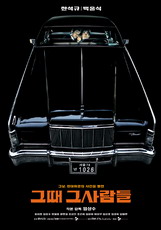 1. The President's Last Bang
1. The President's Last Bang
2. Sympathy for Lady Vengeance
3. Git (Feathers in the Wind)
4. Rules of Dating
5. Blossom Again
6. Welcome to Dongmakgol
7. Tale of Cinema
8. The Magicians
9. This Charming Girl
10. All For Love
Best short film: Where Did You Sleep Last Night?, by Hong Yoon-jung.
I chose Last Bang for its terrific ensemble acting, smooth direction, and for its look back on history with equal doses irreverence and sobriety -- in my mind, just the way to do it. Lady Vengeance I chose for its perfectly controlled execution and for drawing added strength and meaning out of its odd, lopsided structure. Git and The Magicians are both by Song Il-gon, whose career is heading off in fascinating directions, even though festivals and local audiences are both ignoring him. (The Magicians is an extended version of the digital omnibus film commissioned by Jeonju, and is shot in a single take.) This year I have become a card-carrying Song Il-gon fan.
Rules of Dating I chose for its guts and energy, Blossom Again for being completely unexpected despite looking so conventional, and Dongmakgol for keeping so much of its humor and personality despite its blockbuster scale (Typhoon is an instructive counter-example). Tale of Cinema I liked for being such a personal film (the same reason many people hated it), This Charming Girl for its silence and the performance of Kim Ji-soo, and All For Love for juggling its many elements in such an enjoyable and moving way.
As for Where Did You Sleep Last Night?, I must say that in the past couple years I've seen very few Korean short films that really excite me. I'm not watching as many short films as I used to, so perhaps that's one reason, but it seems that as film education in Korea grows more "professionalized", we're seeing less creativity on the part of film students. I may well be wrong about this, and I hope I am, but I can point to only two films from the past two years that grabbed me: last year's Feel Good Story and this year's Where Did You Sleep Last Night. The latter is about two women in a relationship who have a fight, after which one gets out of the car and the other drives off. Their anger soon subsides, but it takes them 12 hours before they are able to find each other again, and this film is about what happens in the interim. The plot itself is quite ordinary, but the progression of events is well-controlled and every small moment in this film carries feeling.
Other highlights of 2005:
* Most exciting film discovery of 2005: Holiday (aka A Day Off) by Lee Man-hee.
* Biggest disappointment of 2005: Duelist
* Favorite non-Korean film of 2005: Tony Takitani (actually a 2004 film but it reached Korea this year -- it was just what I needed on the day that I watched it)
* Favorite retrospective film of 2005: So many, but I think I'll choose Bigger Than Life by Nicholas Ray.
Tom Giammarco
At the end of 2004, I found it difficult to create a list of ten films that I was satisfied calling worthy of being the best in a year that was filled with mediocre releases. In 2005, I find myself facing the opposite problem. The list of films that I feel deserve to be among the best of 2005 is still too long, so it is with regret that I am cutting the following films out; Jo Myeong-nam's Bold Family, Kim Ji-woon's A Bittersweet Life, Jang Jin's Murder, Take One (aka The Big Scene), Bae Chang-ho's Road and Song Il-gon's Magicians. The latter two were cut from the list simply because they have only screened at film festivals and have not yet received general releases. Hopefully they will have a chance to appear on a future list.
So what did make my list of the top ten films of 2005?
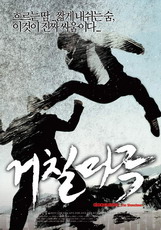 10. Geolchimaru: The Showdown -- I cannot say that I have ever been very impressed with martial arts films. There have been a handful over the years but I generally do not care for movies where the action takes precedence over the story. However, I will make an exception for Kim Jin-seong's Geolchimaru: The Showdown. Instead of being filled with the recently overused 'wire-fu', this film features real martial artists demonstrating their skill in matches against each other to win the honor of battling the grand master. It is a simple plot, but the movie is well worth your time and the fight scenes are very impressive.
10. Geolchimaru: The Showdown -- I cannot say that I have ever been very impressed with martial arts films. There have been a handful over the years but I generally do not care for movies where the action takes precedence over the story. However, I will make an exception for Kim Jin-seong's Geolchimaru: The Showdown. Instead of being filled with the recently overused 'wire-fu', this film features real martial artists demonstrating their skill in matches against each other to win the honor of battling the grand master. It is a simple plot, but the movie is well worth your time and the fight scenes are very impressive.
9. Mokdugi Video -- I have always been a sucker for TV shows that delve into the mysteries like 'In Search Of' or 'Cha Im-pyo's Black Box' despite the fact that I am probably one of the more skeptical people on the planet when it comes to believing in the unknown. I definitely do not believe in flying saucers, alien conspiracies, lake monsters or yetis. I am a little more open-minded about ghosts, but generally believe that most sightings can be explained away rationally. Instead, what I like about these shows is the power that they have which makes one want to believe. That is what Yun Jun-hyeong's Mokdugki Video does. He starts off with a premise that we know is false and weaves a tale around it that is so realistic and believable that the viewer will come away from it wondering if it could be true. Powerful film-making for a low-budget movie.
8. Marathon -- Ok, I know this movie has faced a lot of criticism particularly among foreign critics who find it overly sentimental and commercial. And I am the first to admit that it could easily be a Disney movie or an after school special about a young athlete overcoming great odds and disabilities. But what can I say--I like it. The acting in this movie is phenomenal. Cho Seung-woo does a fantastic job portraying a character afflicted with autism and Kim Mi-suk is admirable in her role as his struggling, protective mother. The story does go about shamelessly trying to manipulate the viewers emotions but it succeeds in doing just that where so many other movies fail (Sad Movie, to name an example). A family oriented movie that winds up being a good film.
7. The President's Last Bang -- Lots of controversy surrounded this film which got me more curious about it release than I normally might have been. And in fact, the political posturing and legal wrangling that surrounded this movie prior and just following its release is still what holds a great deal of this films appeal for me. Any movie that can stir up so much emotion, controversy and debates, pro and con, deserves a second look. However, it finds its way to this list because it is a good movie as well with some fine acting particularly from Baek Yun-shik.
6. This Charming Girl -- How often do we watch a movie where we feel that the characters could actually exist in real life? So many characters in movies are simply stereotypes trapped in their defining roles. However, Jeong-hye, as portrayed by Kim Ji-su under the direction of Lee Yun-gi comes to life and seems as if she could comfortably step out of the movie and easily fit into the world of reality. It is a joy to watch this film and see more of the mannerisms of this quiet postal worker who shows that it is possible for everyone, male and female, to be strong and independent without being prone to loud, brashy, boorish behavior.
5. Crying Fist -- And speaking of excellent performances, both Ryu Seung-beom and Choi Min-shik take what would have been a better-than-average boxing film by director Ryoo Seung-wan and propel it to greatness. Now, boxing movies have never been something I would prefer to watch. Usually, they are too simplistic (sorry Rocky) with only one character developed. But here we find ourselves rooting for both characters knowing that only one of them is going to be able to win. It brings far more emotion to the genre and it is a film that stays with you long after it has finished.
4. Blood Rain -- Sometimes a movie can succeed despite its actors. I have never been a huge fan of Cha Seung-won, finding his acting rather over the top and more suited for comedies than drama. However, I will admit that he surpassed my expectations when he takes the role as a investigator looking into a series of horrible murders on a remote island. What I really love about this film however is the intricate sets, detailed period costumes and the complex plot that sets this movie well above the average whodunit. Period films, such as Chihwaseon and any number of older films from previous decades, can sometimes get a little bogged down with historical details, but this one manages to avoid that pitfall and keeps the story moving right along while providing information about the times.
3. Git (sometimes called Feather In The Wind) -- This is a film for someone who does not mind their movies to be lacking in violence of any kind and the only conflict that occurs is internally. It is a quiet movie set in a beautiful location with vivid colors and memorable images. This subdued film is not for everyone--the person I initially saw it with fell asleep just a third of the way into the movie--but it is a wonderful look at a quietly budding romance.
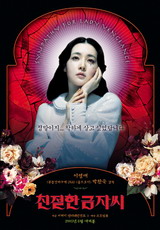 2. Sympathy For Lady Vengeance -- I have heard a lot of people comparing this film negatively with Oldboy, but feel that is unfair to this movie. The final chapter in Park Chan-wook's 'Vengeance Trilogy' it may lack any last minute plot twist or shocking revelation but the character of Geum-ja is more than enough to hold my interest. The way she works towards her ultimate revenge and the changes she goes through in the course of her toils are fun to watch even if her actions lead one to be revolted by their cruelty. This film has more of the feeling of a comic book, with the evil villain played by Choi Min-shik. However the heroine Geum-ja is open to study as to whether she is really as kind as a direct translation of the Korean title seems to indicate and her angelic poses on posters, or is she a manipulative, scheming monster as bad as the target of her wrath. A must see film.
2. Sympathy For Lady Vengeance -- I have heard a lot of people comparing this film negatively with Oldboy, but feel that is unfair to this movie. The final chapter in Park Chan-wook's 'Vengeance Trilogy' it may lack any last minute plot twist or shocking revelation but the character of Geum-ja is more than enough to hold my interest. The way she works towards her ultimate revenge and the changes she goes through in the course of her toils are fun to watch even if her actions lead one to be revolted by their cruelty. This film has more of the feeling of a comic book, with the evil villain played by Choi Min-shik. However the heroine Geum-ja is open to study as to whether she is really as kind as a direct translation of the Korean title seems to indicate and her angelic poses on posters, or is she a manipulative, scheming monster as bad as the target of her wrath. A must see film.
1. All For Love -- I cannot praise this movie enough which seems to be in stark contrast to most other people who do not seem to have anything to say about it. It is really a shame that it opened at the same time that You Are My Sunshine was in theaters. Attention was drawn to popular actress Jeon Do-yeong and her great performance in what I feel was a far inferior film. Interesting You Are My Sunshine and All For LoveAll For Love is not simply one story, but has several plots running simultaneously. The characters from each plotline weave in and out of each others stories but may or may not interact directly with them. Im Chang-jeong gives a memorable performance, perhaps his best to date and the romance of Ju Hyeon and Oh Mi-hee is captivating as it slowly unfolds. For me, this was the most satisfying film of 2005.
2004
Darcy Paquet
Top tens lists assembled in a year like 2003, which boasted a number of obvious achievements like Old Boy, Memories of Murder, Save the Green Planet, A Good Lawyer's Wife, and Spring Summer..., are a bit like shooting fish in a barrel. Top ten lists for a year like 2004, however, tell you a lot more about the personality of the critic drawing up the list. There were few, if any, obvious choices in 2004. I'm going with my gut feelings this year, at the risk of coming across as a lug or a softie, and picking the films that hit me on a gut level.
There were some excellent features I saw in 2004 that would have easily made this list, including Git, Green Chair, and This Charming Girl, but as all are scheduled for release in 2005, I'll set them aside until later. However, I also saw some outstanding shorts, features and documentaries that were produced independently of the commercial sector, and which will never see a theatrical release. A DVD release is possible in theory, but perhaps unlikely. Rather than banish them to a separate list of unreleased films, I'll just insert them between their commercial siblings, rather like the 7 1/2th floor in Being John Malkovich.
(Addendum posted in 2014: I ultimately never finished writing the commentary for this list... how lame is that? I'll post the list regardless, with apologies)
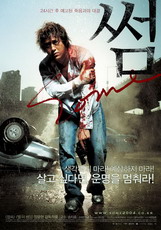 10. Dance With the Wind -- I can see the heads shaking back and forth in bewilderment now. #10, #9 and #8 are all partially flawed films that I would only recommend to certain types of viewers, but for me there was still something fascinating about them. My favorite scene from Dance With the Wind sees our heroine sitting on a park bench talking to her superior in the police force. As her imagination transforms the crowd in front of her into a group of dancing couples, she asks him what he thinks about ballroom dance, and then says, "They say in other countries, even five year-olds can learn it. It's as acceptable as walking hand in hand... Then why do we get so worked up about it?" To me this movie strikes at the heart of an interesting paradox in Korean culture about male-female relations, that you can trace back to films like Madame Freedom (1956). It's not merely a case of western or modern values clashing with more traditional Korean moral systems. By structuring the film around a hero/artist whose motives and morals are constantly called into question, the film seems to reflect well this complicated moral landscape. I'll admit that the film is too long and has other problems, but it comments in interesting ways on the culture in which it was made -- more so than most other films this year.
10. Dance With the Wind -- I can see the heads shaking back and forth in bewilderment now. #10, #9 and #8 are all partially flawed films that I would only recommend to certain types of viewers, but for me there was still something fascinating about them. My favorite scene from Dance With the Wind sees our heroine sitting on a park bench talking to her superior in the police force. As her imagination transforms the crowd in front of her into a group of dancing couples, she asks him what he thinks about ballroom dance, and then says, "They say in other countries, even five year-olds can learn it. It's as acceptable as walking hand in hand... Then why do we get so worked up about it?" To me this movie strikes at the heart of an interesting paradox in Korean culture about male-female relations, that you can trace back to films like Madame Freedom (1956). It's not merely a case of western or modern values clashing with more traditional Korean moral systems. By structuring the film around a hero/artist whose motives and morals are constantly called into question, the film seems to reflect well this complicated moral landscape. I'll admit that the film is too long and has other problems, but it comments in interesting ways on the culture in which it was made -- more so than most other films this year.
9. Some
8. Flying Boys
6. Arahan
4 1/2. Capitalist Manifesto: Working Men of All Nations, Accumulate!
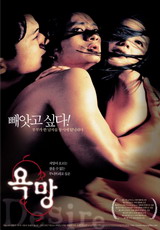 4. Desire -- A feature-length film with less dialogue than your average short, Desire adopts a rather sniveling attitude towards the idea of narrative logic. But for a work that highlights the inexplicable and illogical aspect of human relations, this is entirely appropriate. I first saw Desire on a poor-quality video back in 2002, and it didn't make a big impression on me at the time. But rewatching it on the big screen during its commercial release, the cold, uncomfortable but visually striking aesthetics of the film hit me hard. Perhaps because I was watching it a second time, I didn't worry too much about why A slapped B, why B slept with C, etc., and just tried to connect with the characters on an instinctual level. Also (being more into classical than pop music), this may be my favorite Korean soundtrack ever. The piece by Arvo Part which repeats throughout the film is both utterly haunting and perfectly suited to this film.
4. Desire -- A feature-length film with less dialogue than your average short, Desire adopts a rather sniveling attitude towards the idea of narrative logic. But for a work that highlights the inexplicable and illogical aspect of human relations, this is entirely appropriate. I first saw Desire on a poor-quality video back in 2002, and it didn't make a big impression on me at the time. But rewatching it on the big screen during its commercial release, the cold, uncomfortable but visually striking aesthetics of the film hit me hard. Perhaps because I was watching it a second time, I didn't worry too much about why A slapped B, why B slept with C, etc., and just tried to connect with the characters on an instinctual level. Also (being more into classical than pop music), this may be my favorite Korean soundtrack ever. The piece by Arvo Part which repeats throughout the film is both utterly haunting and perfectly suited to this film.
3 1/2. Ten Ox-Herding Pictures #1: Going Out in Search of the Ox
1 1/2. Feel Good Story
1. Repatriation
Paolo Bertolin
I find myself strongly agreeing with the widespread feeling of disappointment concerning the 2004 output of Korean cinema. On the surface, it was another year of remarkable achievements as the market share at the national box office surged to an unprecedented 57%, sales to international distributors and broadcasters accounted for over $58 million and Korean films scored a phenomenal triplet at the three main international film festivals.
Scratching under this glossy patina, however, I feel one could easily meet with frank and bleak delusion: on the one side, most of the huge box office hits did not equal their technical proficiency with artistic originality or inspiration, when not being also politically questionable (i.e. Taegukgi - to me, in many ways, the worst Korean film of last year); on the other side, the double affirmation of Kim Ki-duk in Berlin and Venice only barely masks multiple misfires in the international arena both from named masters, such as Im Kwon-taek and Hong Sang-soo, and from eagerly awaited sophomore outings from the likes of Song Il-gon and Kim In-sik - notwithstanding the fact that Cannes Grand Prix winner Old Boy is actually a 2003 film. Furthermore, no newcomer in 2004 seemed to register with international awards or critics -- recognition as the aforementioned Song and Kim or Park Chan-ok did in previous years (I personally still haven't had the chance to watch This Charming Girl), while many locally acclaimed titles (My Mother, the Mermaid, Someone Special or The Big Swindle) failed to prove viable once crossing the protective borders of the lenient national press.
Nevertheless, the up-until-recently unthinkable inclusion of two films in both the Cannes and Venice competitions -- as well as in the newly inaugurated Sundance international competitive showcase - have definitely, if somewhat belatedly, sealed a long-due international recognition that is not to be underestimated. In the meanwhile, unexpected and hopefully long-lasting vibes came from the independent scene of filmmakers working on the fringe of the (jeopardizing) industry.
Here follows my own top ten of Korean films for 2004. Two quick side notes: first, the best Korean film I saw in 2004 is actually Yu Hyun-mok's 1965 Chunmong ("An Empty Dream"), as seen in its debatable, but not censorable 'creative restoration' screened at what might have been the last edition of PiFan; secondly, in order to fill up a top ten I have included titles that certainly would have not made it into any top list of recent years.
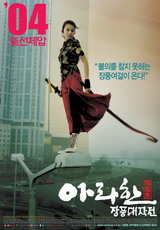 10. Woman Is the Future of Man by Hong Sang-soo -- The inclusion of Hong's latest here is a sort of pro forma. No matter how strenuously defenders try to redeem it from its Cannes failure, this film feels like an underachievement. Hong's magic shines here only intermittently.
10. Woman Is the Future of Man by Hong Sang-soo -- The inclusion of Hong's latest here is a sort of pro forma. No matter how strenuously defenders try to redeem it from its Cannes failure, this film feels like an underachievement. Hong's magic shines here only intermittently.
9. Arahan by Roo Seung-wan -- A pleasant piece of entertainment featuring a laudably measured use of CG and the goofy charms of Ryu Seung-beom.
8. Three, Monster: Cut by Park Chan-wook -- A short that's far better than most longs seen in 2004...
7. My Generation by Noh Dong-seok -- An intimately tender and frailly intense portrait of ordinary lives at the edge of Korea's hit-or-miss society.
6. Invisible Light by Gina Kim -- A powerful and inspiring piece of experimental filmmaking that enlightens the viewer with hope: hope in life from the articulation of the double diegesis; hope in Kim from the talent displayed in shaping such arduous portraits.
5. Spider Forest by Song Il-gon -- Formalist and gelid, yet intrinsically fascinating, Song's sophomore feature paid in full for the high expectations descending from his memorable Flower Island, and generated only tepid responses. Yet, in my opinion this is a film that deserves respectful credit it has not been granted.
4. 3-Iron by Kim Ki-duk -- In his recent article in Film Comment, Tony Rayns argues Kim is overestimated and maybe he is a total bluff. 3-Iron might actually be a consistent plagiarism of Tsai Ming-liang's Vive l'Amour, and Kim certainly does not possess either the visual rigor and invention nor the far-reaching and pervasive complexity of cinematic and thematic articulation of Tsai, yet this is a film that is fully accomplished in its certainly lower scope, and confirms Kim as a highly idiosyncratic filmmaker capable of fulgent invention.
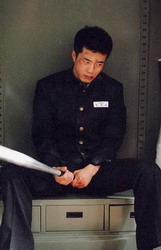 3. Samaritam Girl by Kim Ki-duk -- Kim's best since Bad Guy. Nothing more, nothing less. And this is real, vintage Kim, not the tamed art-house-pleaser of Spring, Summer, Fall, Winter... and Spring.
3. Samaritam Girl by Kim Ki-duk -- Kim's best since Bad Guy. Nothing more, nothing less. And this is real, vintage Kim, not the tamed art-house-pleaser of Spring, Summer, Fall, Winter... and Spring.
2. Spying Cam by Hwang Cheol-min -- This is a film that deserves higher praise on both stylistic and thematic fronts. A tour de force in confined filmmaking, Hwang's film bravely reveals its political scope only bit by bit, while, in the meantime, staging a universal drama of power and ethics in human interaction. A real must see.
1. Once Upon a Time in High School: Spirit of Jeet Kune Do by Yu Ha: My own personal coup de foudre in 2004 Korean filmmaking. A film that echoed so much in me and provided me with so many stimuli for textual analysis it makes me somewhat frustrated and sad that it has been so widely overlooked and underrated in critical discourse.
Tom Giammarco
10. Woman Is The Future Of Man -- The tenth spot on a top 10 list is always the hardest to fill. There are several films I considered placing here like Someone Special, A Family, When I Turned Nine... but I decided to go with Hong Sang-soo's offering. I can't say that I was impressed with it when I first saw it at the theater, but subsequent viewings have made the film grow on me. It's a very introspective film of two men searching for a woman whom they both loved in the past and it benefits from being watched on dvd in the quiet of your home where you have time to think about the story when it is finished.
9. Arahan -- A fun, and a little goofy, action/fantasy film about a rookie cop who discovers that there are tao masters living among us. They recognize his potential and train him in their unique fighting skills. Imagine Spiderman meets Shaolin Soccer. True, the final battle is a little long and not all the special effects are up to snuff, but watching it is an enjoyable way to spend a couple of hours.
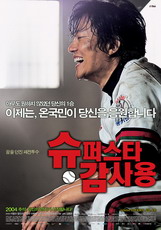 8. Mr Gam's Victory -- Gam Sa-yong has a love of baseball that unfortunately is far greater than his ability. It doesn't help that his teammates on the newly formed Superstars all share that lack of talent. This movie continued this year's trend of recreating the recent past for the background of a story and the film-makers managed to do this without any overbearing sentimentality. (Other movies that were part of this trend of being set in the recent past included Spirit Of Jeet Kune Do, My Mother The Mermaid, and When I Turned Nine.) Lee Beom-su does an excellent job at breathing new life into Mr Gam, an all but forgotten real life baseball player.
8. Mr Gam's Victory -- Gam Sa-yong has a love of baseball that unfortunately is far greater than his ability. It doesn't help that his teammates on the newly formed Superstars all share that lack of talent. This movie continued this year's trend of recreating the recent past for the background of a story and the film-makers managed to do this without any overbearing sentimentality. (Other movies that were part of this trend of being set in the recent past included Spirit Of Jeet Kune Do, My Mother The Mermaid, and When I Turned Nine.) Lee Beom-su does an excellent job at breathing new life into Mr Gam, an all but forgotten real life baseball player.
7. Taegukgi -- I feel the need to defend this choice as a top 10 contender because I know there are some people who dismiss it as a Koreanized Saving Private Ryan. Of course, the battle scenes share some of the same elements as Saving Private Ryan, as I suspect any recent film about war would, but Taegukgi was also something uniquely Korean. The story of 2 brothers conscripted into the army to fight in the Korean War is basically a melodrama set on a battlefield. The acting ranges from adequate to good and even Jang Dong-gun's acting is much better here than in Coast Guard a few years earlier. I saw this in a packed theater just a week after it was released and I was amazed at how emotional people were becoming as the movie progressed. While it isn't unusual for me to cry during movies (heck--I cried during Lovely Rivals!) it was surprising to see an entire audience sniffling at some scenes and to have the entire house applauding at the end. Outside of film festivals, I cannot recall previously experiencing that in Korea.
6. 3-Iron -- Although I admit to being a fan of Kim Ki-duk, I have not been very impressed over the last few years. I didn't like Samaritan Girl or Coast Guard and while Spring, Summer, Fall... etc was pretty to look at, the story left me cold. I preferred some of his early works like The Birdcage Inn, Address Unknown and Crocodile. 3-Iron seems to signal Mr Kim's return to what it was that made him great, but with a difference. The handling of this film seemed more confident and mature than some of his earlier works, almost as if he had looked at some of his past films and ironed out the wrinkles.
5. Springtime -- The story of a man who takes a job as a music teacher in a small town to prepare the students for a coming competition may not seem like the most engrossing, or unique, plot for a film. However actor Choi Min-shik is able to elevate this movie to a new level and save it from being forgotten like the similarly themed Zzang. It is a quiet film, devoid of comedy and somewhat heavy on the drama, but it is definitely worth one's time to check it out.
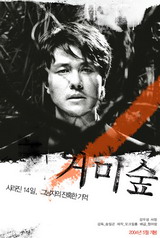 4. Spider Forest -- If you like your movies moody, heavy, on the quiet side and if you don't require the entire plot spelled out for you in a nice neat conclusion, then Spider Forest is a film for you. It boasts stunning cinematography, excellent use of imagery and top-notch acting. Between this film and his follow-up movie, Git, released in January 2005, Director Song has moved to the forefront of Korean cinema and will soon be getting the recognition he deserves.
4. Spider Forest -- If you like your movies moody, heavy, on the quiet side and if you don't require the entire plot spelled out for you in a nice neat conclusion, then Spider Forest is a film for you. It boasts stunning cinematography, excellent use of imagery and top-notch acting. Between this film and his follow-up movie, Git, released in January 2005, Director Song has moved to the forefront of Korean cinema and will soon be getting the recognition he deserves.
3. R-Point -- If you go into this film expecting to be scared by ghosts or zombies haunting a battlefield in Vietnam, you are sure to be disappointed. However, if the dehumanizing aspects of war and man's inhumanity towards man are more frightening to you, then I recommend R-Point. Neither this, or the aforementioned Spider Forest, are what you could strictly call horror movies although they were marketed as such. R-Point is much more of a psychological thriller with supernatural overtones. While there are plenty of ghostly voices and spectral images, it is the heavy atmosphere and dark mood of the film that makes it truly creepy and enthralling.
2. The Big Swindle -- This is one film that I find to be criminally underrated. In one sense, it is perhaps a little familiar as the plot revolves around a bank heist but the betrayal of one of the thieves may call to mind films like Ocean's Eleven. However, this is a slick mystery with fine acting and the plot has a retro feeling to it reminding me in many ways of police and detective shows and films that I remember from the seventies. Actress Yeom Jeong-a continues to choose diverse and often difficult roles for herself and, as always, is a treat to watch.
1. Repatriation -- I debated with myself whether or not to include a documentary on this list but, as it was released in general theaters, I will add it here as number 1. It is, hands down, the best film of 2004. Director Kim Dong-won follows a group of long-time political prisoners after they are freed. While the stories of the men are fascinating, I also like it for the courage it took to make. A great companion film to watch with The Road Taken.
2003
Tom Giammarco
National optimism was still running high after the success co-hosting of the FIFA World Cup and that feeling had spilled over into cinema as well. 2003 was one of the best years for fans of Korean cinema.
1. Oldboy -- I don't think this film needs any introduction. It is probably the first movie that springs to mind when most people think of Korean cinema.
2. Memories of Murder -- Excellent adaptation of real life events as police try to track a serial killer during a time when resources for catching the murderer were limited.
3. Save the Green Planet -- You will either love or hate this movie-I am in the 'love it' camp as one of my favorite actors believes there are aliens among us.
4. Shilmido -- Another film based on real events. Such a movie could never have been made just ten years earlier. Some very good performances by some top actors.
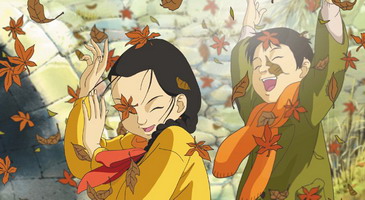 5. Oseam -- I have made it a point to see as many Korean animations that were released in theaters as I could. Oseam is definitely my favorite for its story and detailed but clean art style.
5. Oseam -- I have made it a point to see as many Korean animations that were released in theaters as I could. Oseam is definitely my favorite for its story and detailed but clean art style.
6. A Tale of Two Sisters -- A breath of fresh air in the horror genre. It was unique at the time of its release and remains the representative film when discussing Korean horror.
7. A Little Monk -- I enjoyed this simple story of a young monk-in-training who wants to find his mother. I liked it even more when I learned its connection with another Korean film from 1949.
8. Untold Scandal -- An adaptation of the novel Dangerous Liaisons.
9. The Road Taken -- The story of people accused of being North Korean sympathizers are detained for decades in prison for their beliefs and hopes of reunification.
10. A Good Lawyer's Wife -- Various extramarital affairs threaten to tear a family apart in a cleverly written film with excellent writing.
2002
Adam Hartzell
IT WAS A WONDERFUL YEAR FOR KOREAN FILM. . . DEPENDING ON WHERE YOU'RE COMING FROM
"Whether acknowledged or not, virtually all critical discourse is part of a conversation that begins before the review starts and continues well after it's over; and the best critics allude in some fashion to this dialogue, however obliquely. The worst usually try to convince you that they're the only experts in sight."
-- Jonathan Rosenbaum, "Placing Movies: The practice of film criticism" (1995), pg. 13
I was reading Rosenbaum's book Placing Movies when I wrote this. And I'm glad I did, because it held me back from going off on Travis Crawford's trite treatment - OK, it didn't hold me back completely - of the state of Korean Film in his article, "The Good, The Bad, and The Mediocre," in the November/December 2002 issue of Film Comment magazine. Reading his commentary about the Korean Films packaged at the Toronto International Film Festival this year was like entering Bizarro world. Crawford was often found providing antonyms for the adjectives I would use to describe the same Korean films. For example, Crawford describes Jeong Jae-eun's Take Care of My Cat (2001) as "unfocused and overpraised," whereas I find it under-praised and one of my problems with it is that it's too focused. Whereas Crawford finds the minimalism of PARK Ki-young's Camel(s) "tedious," I find it refreshing. And you don't want to hear the wrath I must keep under wraps upon reading Crawford refer to HONG Sang-soo's Virgin Stripped Bare By Her Bachelors as a "misfire."
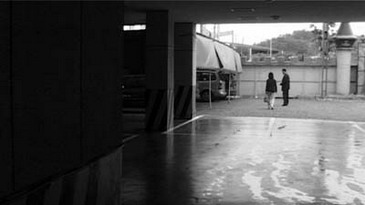 But, as Rosenbaum states above, criticism is conversation. The world of criticism goes back and forth with praise and condemnation of directors, actors, genres, and the cinema of different countries as part of the conversation that is reading others' work or hearing commentary through the cinephile grapevine. Crawford's reaction to Korean Cinema could have been predicted the moment the United States finally opened her eyes to Korean Cinema. U.S. Film magazines continually look for the next big thing like any other U.S. medium. Then, after the next big thing is supposed to change the big picture, the next big thing must be beaten into a little, pulp-ish thing to make room for the next next big thing. The November/December 2002 issue demonstrates this little mise-en-scene within a mise-en-scene in its celebration of Thai Film, in a wonderful article by Chuck Stephens, as the latest big thing. I give Thai Film about two years before it receives its lashes from the obligatory wet noodle. Knowing how these industries work, that of film criticism and film magazines and media in general, I can step back a little and turn my boil down to a simmer. (I mean Virgin Stripped Bare By Her Bachelors is a "misfire"? Since when is a masterpiece a misfire?)
But, as Rosenbaum states above, criticism is conversation. The world of criticism goes back and forth with praise and condemnation of directors, actors, genres, and the cinema of different countries as part of the conversation that is reading others' work or hearing commentary through the cinephile grapevine. Crawford's reaction to Korean Cinema could have been predicted the moment the United States finally opened her eyes to Korean Cinema. U.S. Film magazines continually look for the next big thing like any other U.S. medium. Then, after the next big thing is supposed to change the big picture, the next big thing must be beaten into a little, pulp-ish thing to make room for the next next big thing. The November/December 2002 issue demonstrates this little mise-en-scene within a mise-en-scene in its celebration of Thai Film, in a wonderful article by Chuck Stephens, as the latest big thing. I give Thai Film about two years before it receives its lashes from the obligatory wet noodle. Knowing how these industries work, that of film criticism and film magazines and media in general, I can step back a little and turn my boil down to a simmer. (I mean Virgin Stripped Bare By Her Bachelors is a "misfire"? Since when is a masterpiece a misfire?)
I must admit, however, that I've also noted a little concern in Darcy's written voice this year. He doesn't appear to be as impressed with the Korean films that were released in 2002. Particularly concerning this year's Pusan Film Festival, he noted disappointment regarding the few new films offered in the program. Of course, Darcy's awe is still present when talking about Lee Chang-Dong's Oasis or Park Ki-Young's Camel(s), he doesn't sound as excited with this year's crop of flicks as I've read him in the past. Along with Darcy, the chorus on the koreanfilm.org board has abounded with notes from quite a few posters claiming the decline in the quality of films put out this year. Thus, respecting the opinions of Darcy and my fellow posters, I am more open to this interpretation of the 2002 Korean Film year as not one of the best years for Korean Film.
Yet, I propose an argument in opposition to these claims of a Korean Cinema slump. I argue that 2002 was the best damn year yet for Korean Film . . .
. . . at least in the United States.
Let's look at the facts. No less than eight Korean Films made the U.S. arthouse circuit this year (Shiri (Kang Jye-gu, 1999), Chunhyang (Im Kwon-Taek, 2001), Nowhere To Hide (Lee Myung-Se, 1999), Lies (Jang Sun-woo, 2000), Tell Me Something (Chang Yoon-hyun, 1999), Take Care of My Cat, The Way Home (Lee Jeong-hyang, 2002), and The Isle (Kim Ki-duk, 2000). The Way Home was the first Korean Film picked up and distributed by a major Hollywood studio. (And they actually let us see it!) According to Anthony Kaufman's article on indieWIRE.com, "Why Studio Remakes Don't Suck," major Hollywood studios picked up three Korean films this year for possible future release in a re-written, Americanized form. These were Park Kwan's Hi, Dharma (2001) by MGM, Kwak Jae-yong's My Sassy Girl (2001) by Dreamworks, Lee Hyun-seung's Il Mare (Lee Hyun-seung, 2000) by Warner Brothers.
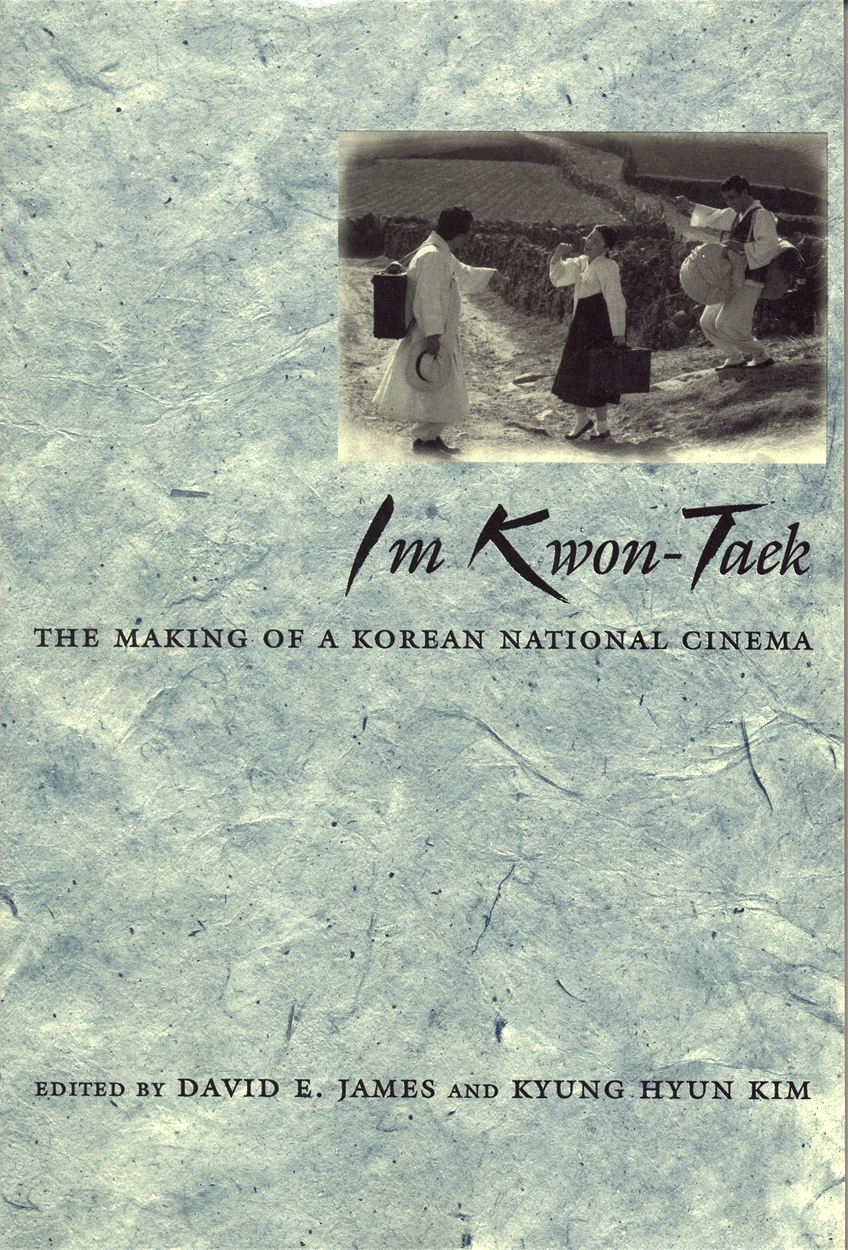 The first book about Korean Film published in the United States was released this year and was all Im all the time, Im Kwon-Taek: The Making of a Korean National Cinema, edited by David E. James and Kyung Hyun Kim. Along with an impressive retrospective in Chicago in November, five of Im's films were shown at the Smithsonian. Hong Sang-soo received a much-deserved retrospective at the University of California, Irvine, in October. The San Francisco Bay Area had its second annual Korean Film Festival in Berkeley with a sizable crowd for its main feature My Sassy Girl. Writer Terry Hong informed me, along with the information about Im's films showing at the Smithsonian, that George Washington University had a Korean Cinema colloquium which was attended by Park Chul-soo (301, 302, 1996, and Kazoku Cinema, 1998). While New York had an exciting turnout for its 2nd Korean Film Festival, the largest of its kind held abroad, colleges like Dartmouth College had Korean Film Festivals and The University of Iowa had it's third. Hell, I even stumbled upon a tiny Korean Film Festival in Chico, California.
The first book about Korean Film published in the United States was released this year and was all Im all the time, Im Kwon-Taek: The Making of a Korean National Cinema, edited by David E. James and Kyung Hyun Kim. Along with an impressive retrospective in Chicago in November, five of Im's films were shown at the Smithsonian. Hong Sang-soo received a much-deserved retrospective at the University of California, Irvine, in October. The San Francisco Bay Area had its second annual Korean Film Festival in Berkeley with a sizable crowd for its main feature My Sassy Girl. Writer Terry Hong informed me, along with the information about Im's films showing at the Smithsonian, that George Washington University had a Korean Cinema colloquium which was attended by Park Chul-soo (301, 302, 1996, and Kazoku Cinema, 1998). While New York had an exciting turnout for its 2nd Korean Film Festival, the largest of its kind held abroad, colleges like Dartmouth College had Korean Film Festivals and The University of Iowa had it's third. Hell, I even stumbled upon a tiny Korean Film Festival in Chico, California.
When you look at this list of U.S. Korean Film happenings, add to it that our man Park Joong-hoon was well featured in Jonathan Demme's The Truth About Charlie (2002), recognize that the Korean-American film Better Luck Tomorrow (Justin Lin, 2002) was picked up by MTV films for eventual distribution, witness that Rick Yune was the bare-shirted, bad guy messing with James Bond in Die Another Day (Lee Tamahori, 2002), and appreciate that Margaret Cho's second live-comedy film, The Notorious C.H.O. (2002), was enthusiastically received, it was a pretty impressive year for all things Korean and film in the U.S..
So, whether or not I'll come to agree with some on the board - if the Hollywood Biggies allow me to see the rest of the 2002 Korean Films - remains to be seen. But from what I have seen, I'm still sticking with KFilm. I was still impressed with the crop of films I got to see this year, and that's without having an opportunity yet to see Oasis, Too Young To Die (Park Jin-pyo), Road Movie (Kim In-sik), or The Resurrection of the Little Match Girl (Jang Sun-woo) films that are argued to be the best the year had to offer by many on this board who've seen them.
If this marks the year Korean Film has long last entered the conversation in the U.S., here are the Top Ten Korean Films that I found most worth listening to this year.
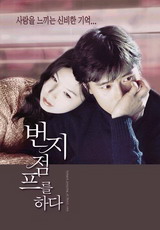 10. Bungee Jumping of Their Own (Kim Dae-seung, 2001) -- This, along with Memento Mori (Kim Tae-yong and Min Kyu-dong, 1999) and what I've heard about Road Movie, demonstrate Korean Cinema's interesting take on how to present lesbian and gay worlds to those who might not be as open to such relationships. It begins as a cheezy melodrama soap opera, a genre that, like Mexico and Hong Kong, Korea is well known for. But the twist in the middle brought a new layer of camembert to the genre. However unintentional, this film centers the Queer triptych mentioned above. By portraying strong enough Straight Allies within their Queer Queries, our more homophobic Aunts and Uncles just might be willing to extend a place at the table.
10. Bungee Jumping of Their Own (Kim Dae-seung, 2001) -- This, along with Memento Mori (Kim Tae-yong and Min Kyu-dong, 1999) and what I've heard about Road Movie, demonstrate Korean Cinema's interesting take on how to present lesbian and gay worlds to those who might not be as open to such relationships. It begins as a cheezy melodrama soap opera, a genre that, like Mexico and Hong Kong, Korea is well known for. But the twist in the middle brought a new layer of camembert to the genre. However unintentional, this film centers the Queer triptych mentioned above. By portraying strong enough Straight Allies within their Queer Queries, our more homophobic Aunts and Uncles just might be willing to extend a place at the table.
9. My Beautiful Girl, Mari (Lee Sung-gang, 2002) and 8. No Blood, No Tears (Ryoo Seung-wan, 2002) -- I place these films together because I love the style of each. My Beautiful Girl, Mari provided me with such lovely images as Namoo floating through living dog clouds and the marvelous worlds inside marbles. It kept me and my comic book artist friend transfixed even though we were watching it on the crappy TV I had at the time. No Blood, No Tears showed that, in Ryoo's Korea, the rain falls anything but plainly on this wonderful garage of characters, parading the exceptional talent in Korea's acting pool. Kick Ass kicking ass.
7. Beautiful Survival (Im Sun-rye, 2001), 6. The Way Home (Lee Jeong-hyang, 2002), and 5. Take Care of My Cat (Jeong Jae-eun, 2001) -- Im's video documentary, which I saw at the 2nd Annual Bay Area Korean Film Festival, provided a wonderful expose on the trials and obstacles for Korean women aspiring to take their seat in the director's chair. During the festival, I had heard comments from some random person that Jeong is difficult to work with, (read: she's a bitch). Im's documentary put that comment in context, chronicling the bitch you have to be sometimes as a Korean woman director to survive a system that continually tries to pull that director's chair out from under you. Although I found Lee's first film, Art Museum by the Zoo (1998), uninspiring, my friend and I found ourselves crying at the end of The Way Home. Yes, it's manipulative, but sometimes I enjoy being manipulated, thank you. And Take Care of My Cat is what we need more of, that is, quality tales of girls coming of age that aren't filtered, (or should I say "focused"), through the hormones of boys. The sisters are sure doing it for themselves, and with a (Ms.) vengeance.
4. Barking Dogs Never Bite (Bong Joon-ho, 2000) -- I finally went and bought myself a Region Free DVD player this year. No longer can The Man tell me what I can see. And no longer can The Man keep such gems as this lovely taboo tale of chases on foot, dreams dressed in yellow hoods, and stories of Boiler Kim. I'm still racing around the apartment complex with Lee Sung-jae and Bae Doona accompanied by the jazzy chaos of the soundtrack.
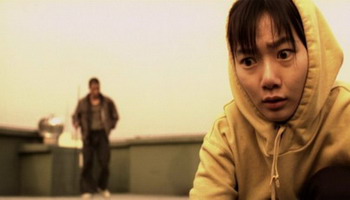 This film is well deserving of all the accolades I read when I joined the Board two years ago. And Bae, who will show up one more time on this list, is now officially one of my favorite Korean actresses.
This film is well deserving of all the accolades I read when I joined the Board two years ago. And Bae, who will show up one more time on this list, is now officially one of my favorite Korean actresses.
3. Turning Gate (Hong Sang-soo, 2002) -- Hong stands alone. He is the director who convinced me to stick with Korean film, and he has yet to disappoint me. Yet when I first saw this film, at home on my old crappy TV, I wasn't sure what to make of it. But when I saw it on a big screen, as it's meant to be seen, I saw another engaging Hong exploration in what our everyday patterns expose about us. Hong's tropes of unsexy sex and deflected distractions heighten our human capabilities by limning our frailties.
2. Sympathy for Mr. Vengeance (Park Chan-wook, 2002) and 1. Camel(s) (Park Ki-yong, 2002) -- Two Parks at different ends of the spectrum of doing what you want with what you have. Park Chan-wook given free reign after the huge success of JSA (2000) takes the money and runs with a film he's been dying to make and we've been dying to see but just didn't know it. Song Kang-ho and Bae Doona continue to impress, providing further spot on performances. Sang takes his character over the brink without taking the viewer over the edge. Park Chan-wook holds nothing back to show us that Vengeance is no ones; it only leads us down a dead end road. On the other side of the do-what-you-want spectrum is Park Ki-yong who does more with less than most big budget directors could ever dream of. Perhaps this is because most of those big-budget directors don't dream in black and white. A refreshing, meditation in minimalism, Park Ki-yong spends $75,000 and gives us $75,000,000. We get to know the characters as they get to know themselves and learn about ourselves in the process, if we're willing to look into this digital mirror. Park Ki-yong takes us on a long drive at the end, more fulfilling than any Sunday drive to the cinema I'd taken before.
LONG LIVE KOREAN FILM!!!
(Note: Travis Crawford has written in with his response to Adam's essay. To read the exchange between both writers, click here.)
Darcy Paquet
It seemed that 2002 was filled with extremes, more so than the several years that preceded it. On the high end we had some truly brilliant movies that will be remembered many years from now. On the low end there was dreck like Emergency Act 19 and She Brings Us Danger. Of course, every year has its stinkers, but this year it seemed that the range in quality was wider than usual.
Perhaps we can point a finger to the Korean film industry's own brand of "irrational exuberance" that saw huge sums of money surge into the industry in 2000 and 2001. With so much cash sloshing around, it became much easier to finance bad movies that perhaps wouldn't have been made in leaner times. This cuts both ways, however -- Park Chan-wook would never have had the opportunity to make his magnificent Sympathy for Mr. Vengeance before Korea's boom.
There were 77 Korean films released in 2002; I tried, but didn't quite manage to see all of them. Many of the films I enjoyed and admired, but couldn't find room for on my list. Park Chan-ok's debut Jealousy is My Middle Name would also have made my list, but it won't get its local release until 2003, so I'll save it for next year.
I also made a special effort this year to watch a lot of older Korean films, and some of these were fantastic. Ones that stand out for me include Shin Sang-ok's Evergreen Tree (1961), for its youthful idealism that feels almost like Communist socialist realism; Lee Man-hee's devilish The Evil Stairs (1964) about a doctor who murders for selfish gain, and suffers the consequences; Yu Hyun-mok's Guests Who Arrived by the Last Train (1967) for its color schemes, its crazy pop artist and the actress Moon Hee (and for alerting me to the fact that Yu Hyun-mok isn't as stodgy as he lets on); Kim Soo-yong's Mist for its brooding tone and the energy of its heroine; and Lee Jang-ho's Fine Windy Day (1980) for Ahn Sung-ki and for portraying how Seoul rose up out of nothing as everyone moved in from the countryside.
But back to 2002... My list is made up of films that surprised and intrigued me, and which I personally enjoyed. I'm a bit schizophrenic in my personal tastes -- I'd probably be one of the few people in line to buy tickets if they screened a double feature of Camel(s) and Boss X-file, and (more embarrassing still) I'd probably have an equally good time in both screenings.
10. Conduct Zero / No Blood No Tears -- I'm going to cheat and squeeze in two films at #10. In some ways they have a lot in common, although one is far more violent than the other. Conduct Zero is a creative, funny, and touching view of the ruthless world of high school in 1980s Korea. No Blood No Tears, on the other hand, is set among a crime-infested underworld, but it is just as creative in evoking the brutality of that world. Both films focus on individuals who try to break free from their surroundings, but their burdens are not so easily shaken off.
9. Too Young To Die -- This film was shot with obvious passion, both that of the director towards his subjects, and that of the two leads for each other. The film has a real point to make, and it was refreshing to see this elderly couple's fearless and overflowing appetite for life. It was also nice to see a film of personal vision, shot independently on a minimal budget, make an impact on the local industry.
8. Bet On My Disco -- A great movie, although I think some of the background music (not the pop songs) really detracted from the film's underlying bite. I love that the movie is content to focus on character, and doesn't worry about starting up a proper storyline until halfway through the film. I also really like the last scene, in part because it is somewhat arbitrary and weak -- it seems more a wink at the viewer than an effort to build a proper Hollywood ending. The film's creativity and uniqueness lie in its quirks and dorky charm, and I like that it's willing to just go with that.
7. Camel(s) -- Love it or hate it, this film has real character. Apart from just being a minimalist film, its black and white digital images and the uncomfortable dialogue between its leads give it a real flavor. What I find most interesting about it is its exposition -- how we know absolutely nothing about these characters at the beginning, and then we are drip-fed small hints that clue us in on their history and what they are doing together. There is also a fair amount of what seems to be useless dialogue, but on second thought it tells us a lot about the two leads. If we care about them, the film has a lot of interesting things to say about them.
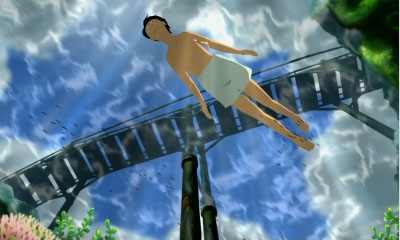 6. My Beautiful Girl, Mari -- On a purely abstract level this animated film produces some gorgeous, unforgettable images. Closer to a painting than a novel, Mari seems to tell us more on a psychological level than it provides us in narrative. Though many people fault it for this reason, it seems improper to criticize a Matisse for its lack of story.
6. My Beautiful Girl, Mari -- On a purely abstract level this animated film produces some gorgeous, unforgettable images. Closer to a painting than a novel, Mari seems to tell us more on a psychological level than it provides us in narrative. Though many people fault it for this reason, it seems improper to criticize a Matisse for its lack of story.
5. Resurrection of the Little Match Girl -- Okay, so shoot me (preferably not with that plastic gun). Everybody hates this film, and moreover most Koreans seem to think it immoral, due to how much money it cost (a remnant of Korea's anti-consumption drive, I think). Nonetheless when I walked out of the theater I had that humming in my head that you only get from really good cinema. I'm not sure how best to defend my reaction, other than that I found it inspiring that a film would depart from so many norms and just do whatever the hell it wanted. I liked that it would stretch scenes or effects beyond any level of prudence. The film is antisocial and perhaps a bit cold, but perhaps it appeals to an antisocial streak in myself as well...
4. Turning Gate -- For me, this film (much of Hong's work, actually) is something that I admire more than I connect to on a personal level. Nonetheless Hong's distant, perhaps cynical view of humanity's callousness and fumbling desire is perfectly realized. The timing, the acting, and the way he manipulates our point of view are so expertly done that he makes it seem effortless. I'm very curious to see the future directions Hong will take as a filmmaker. As he builds a larger collection of work it will become more and more difficult for the world to deny him a place among its top auteurs.
3. Saving My Hubby -- A bombshell of a film, and I mean that in a good way (though it did bomb at the box-office). Slightly hysterical in parts, this movie captures perfectly the disorientation felt by our heroine Geum-soon at being thrown into marriage at too young an age, and finding oneself among the colored hell of Seoul's night life trying to rescue her husband. The various characters, good and evil, that come across her path provide a telling portrait of humanity in all its heights and depths.
2. Sympathy for Mr. Vengeance -- On another day I might have listed this first -- it's clearly one of the most accomplished and astonishing films of recent years. It's not a film I would recommend to all people, given the strength (as opposed to the explicitness) of its violence and its dark themes, but for me it's an instant classic that will only become better with time. Fantastic acting, hugely accomplished camerawork and lighting, haunting sound, a simple but thought-provoking story... Korean cinema can be really proud to list this film as one of its own.
1. Oasis -- Like Sympathy for Mr. Vengeance, this film is like a banner announcing the arrival of a major filmmaker. Not that Lee Chang-dong had been ignored or undervalued before, but Oasis made it clear that he can stand on an equal footing with the very best contemporary directors. It will take some years for him to get true international recognition, but with his talent, it's clearly only a matter of time. This is the movie made me into a card-carrying Lee Chang-dong fan.
Consolation prize for the unjustly overlooked: Park Hee-jun's Are You a True Guy?. Yanked from most theaters after only three days, this film deserved much better, following the (fully justified) roasting of the director's first movie Dream of a Warrior. For me, Are You a True Guy represents hope that even when we have sunk to the lowest level, we can pick ourselves up and return with a quality effort. Too bad that movie theaters didn't give this film a chance to build up any positive word of mouth. Although far from perfect, it's a nice little film.
Kyu Hyun Kim
As of July 22, 2003, I have watched forty-two Korean films released in 2002, only counting ones transferred to DVDs in a correct aspect ratio, or presented in 35mm prints at various film festivals and other venues. Considering that I watch anywhere between 250 to 300 movies a year (about two-fifth of which in regular theaters or revival houses, the rest mostly in DVDs: the number of VHS tapes I rent has significantly declined since 2000... These days, I only occasionally seek out VHS copies of the extremely rare movies not yet released in DVD), this was a rather sizable chunk of the total number of movies I watched last year. Overall, 2002 was an excellent year: there were enough wonderful films to make selection of the ten best a difficult task.
There were several quirky, eccentric films with non-conventional main characters that left strong impressions with me, despite being snubbed at the box office. There were exquisite moments in L'Abri (Bus, Bus Stop), in many ways one of the best acted movies of the last year, but it was too low-octane in terms of drama: it threatened to slip into dreariness. Still, I would have hoped that it did better with both critics and the viewing public. Likewise, it would have been nice if Saving My Hubby, with a star-making performance by Bae Doo-na, probably the actress of the year for 2002, could generate one third of the box office returns for Marrying the Mafia. A Bizarre Love Triangle vanished from the theaters in one week, squashing my hopes to see the film during my visit to Seoul in December 2002. (Thank God for San Francisco Gay and Lesbian Film Festival!) Whatever happens with the screen quota system or fortunes of individual production companies, the domestic distribution network of Korean films must be reformed, so that these unclassifiable movies can have a chance, without having to turn themselves into political causes celebres a la Too Young to Die.
Of course, not all is lost when such experimental cinema shot in digital video as Camel(s) did receive theatrical release, to excellent reviews. I must confess that I was afraid that it would turn out to be an interminably boring Dogme-style effort, but sincere performances of the leads Lee Dae-yun and Park Myung-shin allowed me to access their inner turmoil of the characters, making for a fascinating and rewarding viewing. I have to mention, though, that my patience was sorely tested in a few sections, especially during the noodle-eating scene ("Chwap chwap chwap... kaduduk kaduduk ...slurrrp... Do you know this market in Shinchon?").
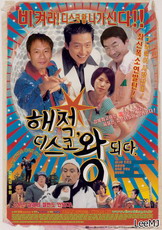 Gangster comedies did just fine in terms of box office throughout 2002, producing at least one genuinely entertaining mojo, Break Out, with a side-splittingly hilarious (and surprisingly moving) performance by Cha Seung-won, before descending into the bottom of the barrel, quality-wise. Horror films were in low ebb (expected to bounce back in a big way in the latter half of 2003), but An Byung-gi, staying within the confines of genre conventions, produced a memorable sophomore effort in Phone. The most significant cinematic trend of the year may have been the nostalgia boom for 1980s, resulting in affectionate little gems like Bet on My Disco and the "My Nike" segment from No Comment, although Kwak Kyeong-taek's Champion failed to generate the attention showered on his earlier Friend and did nothing to change my reservations about his films.
Gangster comedies did just fine in terms of box office throughout 2002, producing at least one genuinely entertaining mojo, Break Out, with a side-splittingly hilarious (and surprisingly moving) performance by Cha Seung-won, before descending into the bottom of the barrel, quality-wise. Horror films were in low ebb (expected to bounce back in a big way in the latter half of 2003), but An Byung-gi, staying within the confines of genre conventions, produced a memorable sophomore effort in Phone. The most significant cinematic trend of the year may have been the nostalgia boom for 1980s, resulting in affectionate little gems like Bet on My Disco and the "My Nike" segment from No Comment, although Kwak Kyeong-taek's Champion failed to generate the attention showered on his earlier Friend and did nothing to change my reservations about his films.
The feature animation breakthrough My Beautiful Girl, Mari is heavily nostalgic like many Korean movies made in 2002 (more or less lifting its setup and some characters from Yu Hyeon-mok's Sea Anemone), but the nostalgia here is unmarred by macho posturing or exclusivism of childhood comradeship: it is exceptionally gentle, evocative and conciliatory. The visuals reflect this attitude of the filmmakers, and they achieve their most stunning effects when they forego dramatic overstatement (and sophisticated computer graphics) and instead show us unfolding of the small-scale magic in everyday life. The movie could have had stronger narrative pull, and Nam-woo's character becomes unbearably irritating on occasion (I am resigned to the obnoxious, self-indulgent behavior of Korean boys in their cinematic incarnations), but this still is a haunting film well worth repeated visitations.
As for big-budget Hollywood-style blockbusters, the less said the better. The fact that some Korean filmmakers keep insisting on slavishly copying Hollywood formulas while others protest the encroachment of the American cultural empire illustrates the strange contradiction of the Korean cinema industry.
One film regularly featured in the best of 2002 lists but not in mine deserves a brief mention. Although visually a beautiful film, The Way Home left me unmoved. I do admit that the film is a well-made fairy tale, a perfect family film in which the urban bourgeois adults can secretly assuage their collective guilt about their undereducated, underprivileged parents left over in the countryside. What lessons their children can learn from watching it are open to question: that not being able to eat uncooked Spam and drink Coke for a while is okay?: that not having a grandmother literally incapable of protest, complaint or expression of autonomy is a sucky thing? Am I heartless for resisting the charms of The Way Home? Well, the Tin Woodsman from Wizard of Oz did pretty well without one...
Now the only "must watch" film from 2002 that I have not gotten hold of yet is Sex is... (Saja seong'eo). I hope to catch up with it soon, and I will put it into the candidate list for the best 2003 films.
So here goes my list of 10 best Korean films released in 2002, needless to say, a very subjective and cranky list full of prejudices and skewed perspectives. I never take off my multicolored glasses when I watch a Korean film!
"Leaving a healthy guy like myself unable to sleep... you are the thief who stole my heart!" "Damn thieves!" "Boo hoo hoo hoo..." --Minister Min's colleague reading his "suicide note" at his wake, and the mourners responding.
10. YMCA Baseball Team* -- I am not a sports fan at all. The only sports that I can actually do, without causing some serious bodily harm to myself as well as those around me, is cross-country skiing. My ignorance about soccer, baseball, basketball, golf and any other sports dealing with spherical instruments tiny, small, big and really big is absolute. The point is, whatever made me deeply appreciate this deceptively unassuming period comedy was not its subject matter.
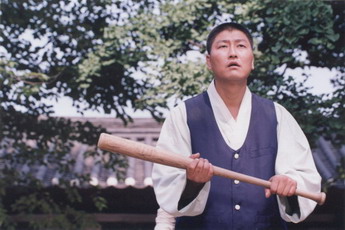 YMCA Baseball Team is a charming, relaxing entertainment, but its lack of ideological axe to grind and artistic pretensions paradoxically makes it a powerfully subversive commentary on the way Koreans perceive their modern history. Even though the story itself follows a predictable arc of the colonized Koreans against the Japanese colonizers, the director/scenarist Kim Hyeon-seok infuses the film with the wide-eyed perspective of a contemporary Korean freshly discovering the past. His endeavor is ably supported by detailed but unobtrusive production design, evocative cinematography and wacky and creative music. The film's spirit is perfectly captured in the glowing star-performance by Song Kang-ho, and the funniest sequence in the movie involving a switcheroo between Ho-chang's love letter to Jeong-rim and her father's written denunciation of the Japanese. History in YMCA Baseball Team is no longer an oppressive chimera nurtured on rigid ideological platforms and moral certitudes, but is reconstituted as a field of artifacts that continuously enter into new relationships with us who live in the present. The film introduces fun-seeking open imagination into the act of grappling with the past: and counter-intuitively, by doing so, it restores dignity and relevance to the historical subjects.
YMCA Baseball Team is a charming, relaxing entertainment, but its lack of ideological axe to grind and artistic pretensions paradoxically makes it a powerfully subversive commentary on the way Koreans perceive their modern history. Even though the story itself follows a predictable arc of the colonized Koreans against the Japanese colonizers, the director/scenarist Kim Hyeon-seok infuses the film with the wide-eyed perspective of a contemporary Korean freshly discovering the past. His endeavor is ably supported by detailed but unobtrusive production design, evocative cinematography and wacky and creative music. The film's spirit is perfectly captured in the glowing star-performance by Song Kang-ho, and the funniest sequence in the movie involving a switcheroo between Ho-chang's love letter to Jeong-rim and her father's written denunciation of the Japanese. History in YMCA Baseball Team is no longer an oppressive chimera nurtured on rigid ideological platforms and moral certitudes, but is reconstituted as a field of artifacts that continuously enter into new relationships with us who live in the present. The film introduces fun-seeking open imagination into the act of grappling with the past: and counter-intuitively, by doing so, it restores dignity and relevance to the historical subjects.
In the lovely epilogue of the director's cut, Ho-chang's great-grandson, a pitcher for a little league team, encounters the vision of Ho-chang. At first glance, the distance between 1905 and 2002 seems unbridgeable, but when we can imagine our ancestors as having the same aspirations, fears, desires and frustrations as we do today, it disappears. We then finally realize the artifacts of the past --the faded photographs, the Court Inspector's medallion, the blood-stained and torn yangban's overcoat --speak to us with living voices. The kid, trusting his great-grandfather's gentle beckoning and reassuring smile, throws the ball, reaching out toward the apparition from the past.
It is the single most moving final image from a 2002 Korean movie.
*Note: this ranking is given to the director's cut of YMCA Baseball Team, unfortunately (so far) only available as a part of the special edition DVD.
"Do you like it when I turn like this?" --Kyung-su to Seon-yeong, gyrating his penis inserted in her vagina.
9. Turning Gate -- Hong Sang-soo's films are meticulously designed, constructed, and realized. They are faithful to the grammar of "artistic cinema," and instantly recognizable as such. Their Rubic's Cube narratives encourage the viewers to watch them again and again, to discover the clues and codes hidden in the throwaway gestures and dialogues. His films, via their "minimalist" set-ups and compositions, seek to keep his characters helplessly exposed under our gaze. And yet, these characters are not just plucked out of "real life:" their seeming "naturalism" is a ruse.
Turning Gate is less self-consciously "arty" than his previous works, Power of the Kangwon Province and Virgin Stripped Bare by His Bachelors, but it is, I feel, one gigantic, nasty snicker at the "love" and "meaning of life" as understood by modern Koreans. When, in an early scene, a producer-friend of Kyung-su solemnly intones, "I know it is difficult to live as human beings... but let's not become monsters," one is not sure whether to laugh out aloud or cringe in embarrassment. But when Kyung-su repeats this same dialogue to his drunk-as-a-sperm-whale writer pal, there is no proper reaction other than laughter, at the very inanity of people who can possibly mouth these lines as if they are serious. From then on, the more characters behave like unredeemable dorks, the funnier the film gets.
Throughout the movie, I found myself laughing my lungs out: Turning Gate was indeed one of the funniest Korean movies from 2002. I felt guilty not including the film in this list, after having so much fun at the expense of the film's characters. However, I am not sure I could really describe my experience as having "enjoyed" the film. Turning Gate may well be a perfect example of postmodern art cinema: the viewers are invited to be voyeurs at this simulacrum of real life, (not the "real" real life, but the sand-papered, peephole-punched, cinematic "real" life) where the dialogues and situations are depleted of all "meanings," political, philosophical or emotional, where the characters act out their "natural inclinations" in the way that allows the viewers to pretend that they identify with them, all the while deriding their dunderheaded behavior.
I am certain of one thing though: I am mighty glad that my life is not unfolding in a Hong Sang-soo film. At least, I hope it isn't.
"Dumb bastard. Know what's the sorriest thing in the world? Being stupid." --KGB to Dokbul
8. No Blood No Tears -- Unfairly branded during its initial release as a capitulation to the temporally convoluted caper-film subgenre popularized by Quentin Tarantino and Guy Ritchie, No Blood No Tears is in many ways every bit as ambitious as Ryoo Seung-wan's debut film Die Bad, even if its virtues are not as readily apparent.
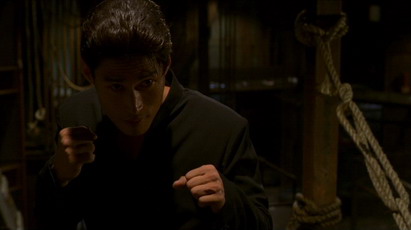 The film features typecast-smashing performances from Jeon Do-yeon and Jeong Jae-yeong, and is fantastically cast with older actors including Lee Hye-young, still quite glamorous, Paek Il-seop as a hippopotamus-like middle-rank boss Chil-seong, Kim Young-in and Pak Chan-gi as two aged loan sharks always three steps behind their "client," and Shin Gu, the paterfamilias in Christmas in August and The Foul King, amazing as the churchgoing gangster boss KGB with the heart of a cobra.
The film features typecast-smashing performances from Jeon Do-yeon and Jeong Jae-yeong, and is fantastically cast with older actors including Lee Hye-young, still quite glamorous, Paek Il-seop as a hippopotamus-like middle-rank boss Chil-seong, Kim Young-in and Pak Chan-gi as two aged loan sharks always three steps behind their "client," and Shin Gu, the paterfamilias in Christmas in August and The Foul King, amazing as the churchgoing gangster boss KGB with the heart of a cobra.
In terms of stylistic flourishes, No Blood No Tears is possibly the most dazzling Korean film released in 2002. A dog-fight between Jeong's Dokbul and the KGB's enforcer (the martial-arts coordinator Jeong Du-hong), dressed in a natty black Mao jacket and walking around with an erect stature of a public works inspector, is going to remain a classic of its kind. Inevitably, some of these outre and eye-popping touches clash with one another. Consequently, there is less of a coherence of the tone in this film, ironically, than in Die Bad, which was put together from separately made three shorts.
And yet, behind its sneaky humor and extravagant violence lies an unwavering gaze of an auteur, sharply intelligent, sympathetic yet tough-as-nail. No Blood No Tears in the end reveals itself as the patented Ryu Seung-wan brand of Cinema of Pain, in which only those who know the taste of their blood and their tears deserve to be delivered from Hell.
"What do you think will happen from now on?" "Well... I don't think it will work out between us." "Probably not." -- Conversation between Mi-heun and In-gyu, after which they spontaneously break out in smiles.
7. Ardor -- The documentary director Byun Young-joo's feature film debut was perhaps the most underrated Korean film of 2002. Ardor painfully observes the disintegrating subjectivity of a once-content housewife, whose shell of a bourgeois nuclear family is smashed like an eggshell with an absurd ease one night. The film, after establishing the background for Mi-heun's deterioration, moves away from the standard melodrama toward feminist grounds: its focus never strays away from Mi-heun (a great role for the under-appreciated Kim Yun-jin) and it dares the audience to feel her shattering headaches, experience the hellish ennui of her life with her husband, listen to the resonances and discordances Mi-heun's "inner music" produces with other women, including her mother and daughter, and taste the perky highs and petty disappointments of her love affair. And yet the movie is no screeching political tract. Director Byun refuses to glorify Mi-heun's choices: neither does she lose compassion for other characters.
When Miheun finally meets and begins an extramarital relationship with a seemingly callous lothario (In-gyu, played by Lee Jong-won), a country doctor with a wife enjoying a jet-set life in Seoul, the heavy-breathing rolling in the hay fails to materialize, despite extensive nudity. The two damaged souls seek each other out, not with the romantic desperation or cocky nihilism so familiar from other movies, but with sorrowful recognition of each other's mirror images.
In the end, Ardor succumbs to the cliches of melodramatic manipulation, but until then, it provides a heart-wrenching glimpse into the feminine self sundered apart, stitching herself together with Sysiphian efforts. It is a true adult romance, perhaps bound to be neglected in this era of colonization of the cinema by comic books, TV series and video games.
"Give me an honest answer. Do you like Susan or Kyung-ah?" --Na-young to Jung-pil
6. Conduct Zero -- Like where to begin? The direction is tight. I mean as tight as Calvin Klein's jeans on Brooke Shields,' er, lower parts. Not stretched like overcooked ramen noodles. This movie doesn't strive for "comedy," it's already got barrels of wit. No stupid sex jokes, no crummy slapstick, no weepy sniffy three-hanky plot Pretzels, no pukey-sweetie goody-two-shoes characters, no disgustingly horny cretinous hangdogs, no drooling psychopaths who pass for "interesting" kids in other movies of this kind, no Nazi-concentration-camp-guard or "duh-where-is-my-chalk" imbecile teachers.
The cast is singularly-bodaciously guh-reat. First of all, the kids in this movie look tall, you know? In most teen movies they never bother to show the kids in full stature, interacting like normal human beings with their environments. The goofy and weird kids here look like normal kids with goofy and weird expressions, instead of human chipmunks and rhesus monkeys. I had no idea that Im Eun-gyung could act: after all, my image of her was that of the living mannequin she played in Resurrection of the Little Match Girl. In this movie, she wears a pair of dinner-plate-sized glasses, sure, and gobbles up a half-eaten dumpling found in a garbage can, but is totally winning. She's got the speech pattern of a nerdy-but-perky well-to-do '80s girl perfect! She is so convincingly shy yearning for a first kiss, adorable beyond belief! As for Ryu Seung-bum and Gong Hyo-jin, how can I put this without sounding like a weenie fanboy of the couple? Well dish it, I am the number-freaking-one weenie fanboy of theirs! They are fabulous together, they are fabulous on their own, they are just so frigging talented, they completely disappear into their roles. I've never seen the kind of chemistry between any major Korean stars in last 5 years as Ryu and Gong casually sling over their shoulders in their scenes with minimum of dialogue ("What are you doing here?" "Just passing by." "Go ahead and pass by then.").
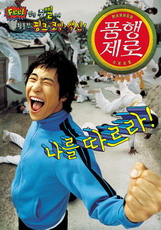 All this would be more than enough for any ordinary movie, but in addition Conduct Zero contains two CGI-based "fantasy-action" sequences that are just so gong-dang creative and audacious. There is more inventiveness and sheer sense of fun in the first five minutes of Conduct Zero than in any Korean blockbuster-wannabees released last year. And to cap it off, the movie sneaks in pathos and clear-eyed sympathy toward the characters without ever turning mawkish or manipulative. I think Hollywood and Japanese filmmakers making nostalgic teen flicks should buy prints of Conduct Zero so that they can study how the director Jo Geun-shik and screenwriters Lee Hae-yung and Lee Hae-sung did it so well. Hey man I even loved the Korean hip hop songs heard in the soundtrack!
All this would be more than enough for any ordinary movie, but in addition Conduct Zero contains two CGI-based "fantasy-action" sequences that are just so gong-dang creative and audacious. There is more inventiveness and sheer sense of fun in the first five minutes of Conduct Zero than in any Korean blockbuster-wannabees released last year. And to cap it off, the movie sneaks in pathos and clear-eyed sympathy toward the characters without ever turning mawkish or manipulative. I think Hollywood and Japanese filmmakers making nostalgic teen flicks should buy prints of Conduct Zero so that they can study how the director Jo Geun-shik and screenwriters Lee Hae-yung and Lee Hae-sung did it so well. Hey man I even loved the Korean hip hop songs heard in the soundtrack!
If somebody had told me last year, "I think next year we are gonna see a teenage comedy set in a 1980s high school that's going to shape up to be a totally cool movie without a shred of storytelling incompetence, contemptuous manipulativeness, pretentious pseudo-artistic stylistics, out-of-control sentimentality, slavering capitulation to the CF-addled teenage mentality," my response would have been "Dream on, pal." Yech, I am so freaking happy that I was proven wrong!
Conduct Zero rules!
"I have an absolute confidence... that I won't be found out." --Yeon-hee to Jun-yeong
5. Marriage is a Crazy Thing -- I won't repeat what I wrote in my review, except that I love, I mean I really do love, this svelte, sexy, sardonic piece de resistance. Sure, it is not as cinematically inventive as some other films in this list, but no other Korean movie has a couple bickering and splitting over bean sprout bibimbap, either.
"Let's have one groovy fun time together!" --Grandpa to Grandma during their truncated wedding ceremony.
4. Too Young To Die -- Pak Jin-pyo's startling use of sexuality can find parallels only in such world-famous films as Oshima Nagisa's In the Realm of the Senses. But the real reason I love Too Young To Die is that it is such a life-affirming vision, that speaks of the hard-earned truths about life and death, transcending cultural differences, language barriers and our assumptions about cinema: for whatever else may happen to us, we are all humans, and as such we all have sexual desires, and we all grow old.
Thank you, director Pak, for holding out for your vision.
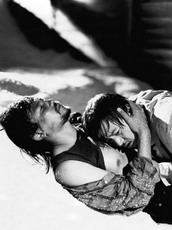 "Is it okay... if I just love you?" --Daesik to Sanghwan
"Is it okay... if I just love you?" --Daesik to Sanghwan
3. Road Movie -- If Too Young To Die is the ageless Tai-chi master who subdues ten muscle-bound young warriors with a flick of her wrist, then Road Movie is a battle-scarred drifter-swordsman, wrapped in worn garments, slashing open a steel armor with a flash of blade. But he also plays a soulful tune with his flute, the music that brings tears to the enemies' eyes, tugging at their sleeves to let go of the swords.
The movie keeps alive the heritage of socially conscious, character-driven "angry young man" films of 1980s, made by such luminaries as Pak Kwang-su, Lee Jang-ho and Bae Chang-ho. Tough, open-minded and altogether brilliant, Road Movie is the kind of Korean film that most clearly demonstrates what Korean film is now, as opposed to what it was ten years, nay, five years ago.
"When a woman says... I want to sleep with you... you don't know what it means?" --Gongju to Jong-du
2. Oasis -- There are always elements in a Lee Chang-dong film that leave me vaguely dissatisfied. Oasis is not an exception. I did not feel the quasi-O. Henry climax of the film brought the character dynamics to a successful resolution. The coda felt tacked on to satisfy the need for an emotionally satisfying closure. Jong-du is given too many breaks, stacking the deck against his (admittedly slimy) family members. (There is also that... forced sex on a disabled person issue, but let's set that aside for now)
And yet, Oasis is great filmmaking pure and simple, that signals one of the culminating points for the literary social realism which have dominated the high-culture end of Korean cinema for the last 40 years, but what is truly surprising about the film is how generous and forgiving it is. If Peppermint Candy and Green Fish unflinchingly illustrate the loss of humanity and depletion of love that Koreans had faced as they struggled through the turmoil of 1980s, Oasis shows that love is not lost, that humanity may be recovered. Fantasy and dreams, once scorned out of the canvas of Korean filmmakers as the opiate of the masses, are rehabilitated into the pigeons made out of light and the beautiful South Asian dancer and her baby elephant, blessing the disadvantaged but undefeated Gong-ju and Jong-du, shut out from the "normal" routes of communication and social interaction. Oasis is a statement about hope, and a powerful confirmation of the (artistic) imagination that breaks through the reality and reforms it.
"I know you are basically a good kid... so you know why I must kill you, don't you?" --Dong-jin to Ryu
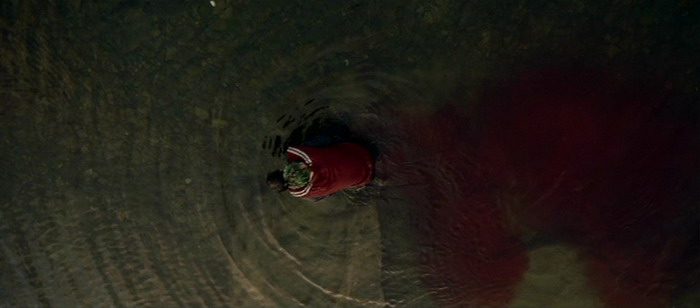
1. Sympathy for Mr. Vengeance -- There are two absolutely certain things in my life. One is that my cat, Guru, loves my wife, his true owner. The other thing is that Sympathy for Mr. Vengeance is a masterpiece. I won't go into discussion of the movie itself again... I anticipate numerous occasions in the future in which I will contribute my share to letting the cinephiles of the world discover this unique film. Someday, if the stars align right, I hope I could write a 150-page book just on Sympathy.
Tom Giammarco
For me to take notice of a trend, it has to be fairly obvious. Much of what I have to say, I am sure has been said elsewhere and more eloquently, but here are my two cents.
One of the best events in the film industry was the triumph of Too Young To Die over the Censorship Board. Most people may know how this film depicting explicit sexual acts between senior citizens challenged the sensibilities of the censors and was nearly banned. However, after substantial publicity, the ban was removed and the movie was allowed to be shown in its entirety in local cinemas. Likewise, Road Movie, a drama which dealt frankly with a gay relationship, passed the censors without problem whereas a few years earlier it never would have passed.
The increasing recognition of Korean movies at major international film festivals may be one of the reasons that the censor board is loosening its iron grip. The international community is beginning to recognize that some of the best movies in the world are coming out of Korea and it showed that recognition by bestowing prestigious awards on Oasis, My Beautiful Girl, Mari, and Chihwaseon. Many other Korean films were shown at festivals around the world.
2002 was the year that the term 'Copywood' was coined in reference to productions of big-budget Hollywood-style imitations designed to be 'blockbusters'. While imitating styles and plots of foreign movies has a long history, it reached its pinnacle with the releases of R U Ready and Resurrection of the Little Match Girl.. Local audiences gave these bloated movies a well-deserved snubbing however and hopefully we have seen the end of this trend.
Instead of the blockbusters, Korea was treated to quiet hits. The Way Home, Marrying the Mafia, Sex Is Zero, and Wet Dreams were surprisingly successful at the box office despite their modest budgets and relatively unknown casts and/or directors.
Perhaps to capitalize on the increased overseas market, or perhaps an indication of the increased use of English nationwide, a record number of Korean features this year were given English titles as their main title (as opposed to having a Korean title and later being assigned an English one). Twenty of the seventy movies, I considered (however briefly) before writing this, had English titles rather than Korean. That is almost 30%. These included Turn It Up, Who Are You, Over the Rainbow, Surprise, Yesterday, etc.
Unfortunately, the 'comic-gangster' genre, a personal dislike of mine, remained strong and Koreans also saw the first spoof of Korean movies with Funny Movie -- but it failed to live up to its title.
Below I have listed my top ten choices for 2002.
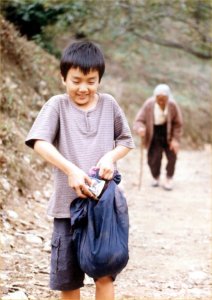 1. The Way Home -- My favorite movie of 2002. The Way Home hit all the right notes. The story, featuring a young boy raised in the city and accustomed to the instant gratifications of modern life, is forced to stay in a rural mountain home with his mute grandmother, is simple and straightforward. Even though he often comes across as a brat, the boy's actions in the movie are 100% believable. The theme of the film is nostalgic while not being overly sentimental. The scenery and cinematography were amazingly beautiful and the story of how Kim Eul-boon was chosen to play the grandmother seems as if it was fate taking a hand. I also like how this story takes a theme common in older Korean movies and reverses it. There are dozens of examples of movies from the 50's all the way up to the early 90's of people from the country moving to the city and being forced, often comically, to adapt to modern life. Fortunately this film avoids the slapstick comedy or patronizing attitudes that were found in those old movies. Instead what we have here is a movie with heart.
1. The Way Home -- My favorite movie of 2002. The Way Home hit all the right notes. The story, featuring a young boy raised in the city and accustomed to the instant gratifications of modern life, is forced to stay in a rural mountain home with his mute grandmother, is simple and straightforward. Even though he often comes across as a brat, the boy's actions in the movie are 100% believable. The theme of the film is nostalgic while not being overly sentimental. The scenery and cinematography were amazingly beautiful and the story of how Kim Eul-boon was chosen to play the grandmother seems as if it was fate taking a hand. I also like how this story takes a theme common in older Korean movies and reverses it. There are dozens of examples of movies from the 50's all the way up to the early 90's of people from the country moving to the city and being forced, often comically, to adapt to modern life. Fortunately this film avoids the slapstick comedy or patronizing attitudes that were found in those old movies. Instead what we have here is a movie with heart.
2. Oasis -- When I select movies that I enjoy it is often the story that causes me to choose one over another. This is not the case for Oasis. Here it was the acting, easily the best that I have seen this year. Moon So-ri delivers a powerful performance. One can easily be fooled into thinking that she actually has cerebral palsy. Sol Kyung-gu is also convincing as the ex-con who falls in love with her. I am sure that this will find its way to the top of most people's lists. It does not lead mine however because I was not as enamored with the story as I was with The Way Home. It also seemed ready made for the international art scene rather than being concerned about release domestically.
3. Bad Guy -- Whatever you think of this movie, you cannot deny that it is controversial. Rarely have I discussed a film for so long after viewing. The motivations of the characters, believable or not, were the subject of passionate conversations with my friends. There are also a lot of nice touches and images that take more than one viewing to register. The cinematography is dark but the glaring neon often gives a surreal feeling to the film. One will either love it or hate it, but it is one film that is hard to ignore.
4. Sympathy for Mr. Vengeance -- Speaking of dark films... When this film was being advertised, the papers were calling it 'hard-boiled'. I know hard-boiled sometimes means tough but I wasn't exactly sure what it meant when applied to this film. I went in expecting something like Say Yes and came out numb. I hadn't felt like that since I saw Seven years ago. This film is brutal. The violence and the emotions chew you up and spit you out. Definitely not for everyone.
 5. Chihwaseon -- A beautifully filmed movie. Life in ancient Korea springs from the screen in breathtaking shots. While the acting and the story are first rate, the cinematography is what made this film worth watching for me.
5. Chihwaseon -- A beautifully filmed movie. Life in ancient Korea springs from the screen in breathtaking shots. While the acting and the story are first rate, the cinematography is what made this film worth watching for me.
6. 2009 Lost Memories -- This movie would have ranked higher on my list if it hadn't been for the last 20 or 30 minutes. Prior to that, it was quite a well done alternate history and mystery. When it got into time travel, the plot unravelled but I am willing to forgive that due to the performances offered by the primary players.
7. My Beautiful Girl, Mari -- This is a beautifully animated story that deserves the awards it has been getting. I have been bored to tears in recent years with movies like Avalon or Final Fantasy -- animation done completely with CGI and based on video games. Mari is an original story animated in a flowing style that, rather than trying to be realistic, instead tries to be fantastic. And it succeeds. Hopefully this will be a start for Korea's previously undistinguished animation to build upon.
8. Bet On My Disco -- I am not going to try to defend my position on this movie. I liked it. Maybe it was the chemistry between the cast or because of the recreation of 80's styles. Maybe it was the throwback to another theme common in old Korean movies--girl forced to work in hostess bar/nightclub/coffee shop to earn money for her sick father/mother/brother/child or the originality of the method she must be rescued (by disco!). It is a movie that sets out to entertain and it does. What more can one ask?
9. Phone -- Another guilty pleasure. I am a sucker for horror movies, but the genre rarely gets much respect. Of course, 99% of the genre does not deserve much respect... However, as with Bet On My Disco, Phone sets out to achieve its goals and is successful. It manages to be frightening and entertaining. What guaranteed it a place on my top ten list however, was the performance of the little girl, Eun Seo-woo.
10. KT -- A fictionalized account of the events occurring leading to the kidnapping of Kim Dae-jung in the 1980's. Rarely do Korean films deal with this era when a military coup overthrew the democratically elected government. A Petal does a good job of showing the Kwangju massacre, but there are not many other films that go into the politics of the time. I would have liked to give this film a higher rank, but it would have had to have been more historically accurate than it is.
The final slot on any list is always difficult to fill. From what I know if it, I suspect Road Movie might have found a place on my list, but I have not seen it. I briefly considered Champion, Turning Gate, and Sex Is Zero for the final slot but settled on KT because of its subject matter. Any of those three are worth an honorable mention.
2001
Tom Giammarco
Although 2001 was right in the middle of the new Korean Wave, I had more trouble than I thought I would have coming up with a list of ten favorite movies.
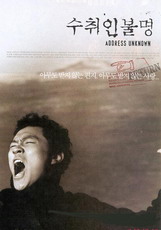 1. Address Unknown -- Quite possibly one of my favorite of the Kim Ki-duk films currently on DVD.
1. Address Unknown -- Quite possibly one of my favorite of the Kim Ki-duk films currently on DVD.
2. Friend -- Following after Beat, Friends surpassed its predecessor in popularity as a film which Korean men could easily identify with.
3. Bungee Jumping on Their Own -- An intriguing film that causes controversy where shown as a high school teacher falls in love with one of his male students whom he believes is the reincarnation of his dead girlfriend.
4. I Wish I Had a Wife -- Romances are few and far between on this list of 100 films, but with Jeon Do-yeon and Seol Kyeong-gu, how can you go wrong?
5. Failan -- A couple, married on paper but whom have never met, use the ideal of each other to try to improve their tragic lives. Unforgettable.
6. Musa -- An epic film that has some powerful performances but the key strength of this film is the story.
7. Waikiki Brothers -- A look back at the 80s where a group of high school friends make a band. Written that way, it doesn't sound very inspiring, but this is a must see film.
8. Volcano High -- This one is just fun.
9. One Fine Spring Day -- The wonderful backgrounds visited by the characters remain with you long after you've seen the film.
10. Sorum -- This is one thriller..or is it a horror film.. that makes you think. The ending leaves a lot of questions unanswered, but it is quite good.
2000
Tom Giammarco
Honestly, it has been a decade since I have seen many of the films from this year, but the ones appearing on this list all stood out for one reason or another. I think it is time for me to dust off the DVDs and take a look at them again.
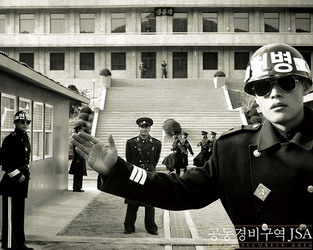 1. JSA -- Never mind the top ten of 2000, this film may have a place among the best Korean films of all time. Excellent movie of a forbidden friendship across the DMZ that goes horribly wrong.
1. JSA -- Never mind the top ten of 2000, this film may have a place among the best Korean films of all time. Excellent movie of a forbidden friendship across the DMZ that goes horribly wrong.
2. The Isle -- This is a truly unforgettable movie that has been discussed at length on internet forums around the world. The beauty of the background stands in sharp contrast to the macabre events that take place during the film that made Kim Ki-duk a household name for a time.
3. Peppermint Candy -- The powerful image of the man standing with arms outstretched on the train tracks has become one of the most familiar images of Korean films. Excellent story telling skills employed to tell the tale of one man's life.
4. Die Bad -- Ryu Seung-wan's debut film shows the power and creativity that was such a part of Korean cinema at that time. The relatively simple story comes off quite stylized and very entertaining.
5. Barking Dogs Never Bite -- A quirky story of a man trying to help a young woman locate her dog even though he is had a part in the puppy's disappearance.
6. The Foul King -- An unusual comedy of a man powerless in his job and home life who decides to take control of at least part of his life through professional wrestling.
7. Ditto -- One of two films, the other being Il Mare, produced this same year involving time separated lovers. Ditto offers has some very good acting.
8. La Belle -- Artistic cinematography is what makes this movie special. I remember thinking when I first saw it that the movie reminded me a little of Betty Blue.
9. Happy Funeral Director -- Underrated! This film needs to be seen more. Unfortunately, I have not yet been able to find it for sale and have not seen it in a long time. But I clearly remember that it was a beautifully filmed tale filled with some very touching, emotional scenes.
10. Jakarta -- With some careful planning, a group of unlikely thieves pull off a bank robbery. I was surprised by quite a few of the twists that the plot took and how it all came together by the end of its running time.